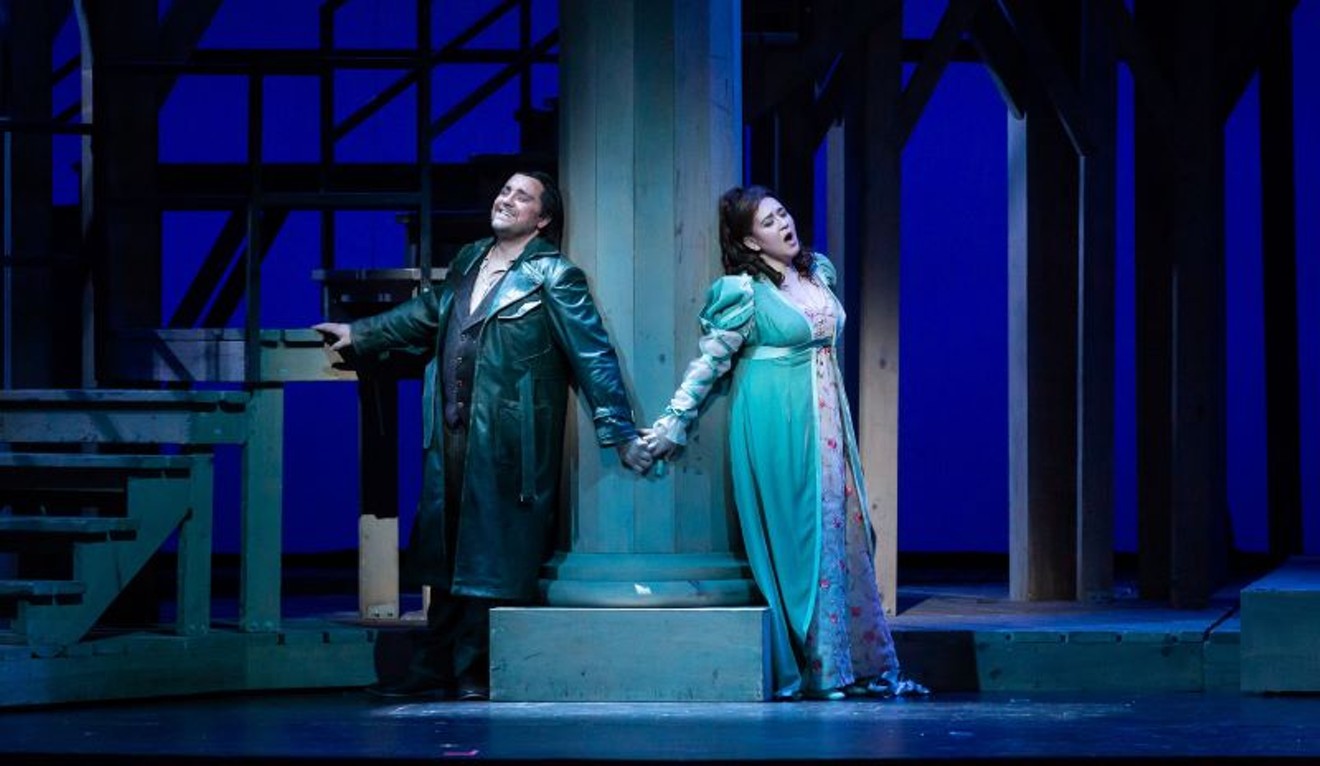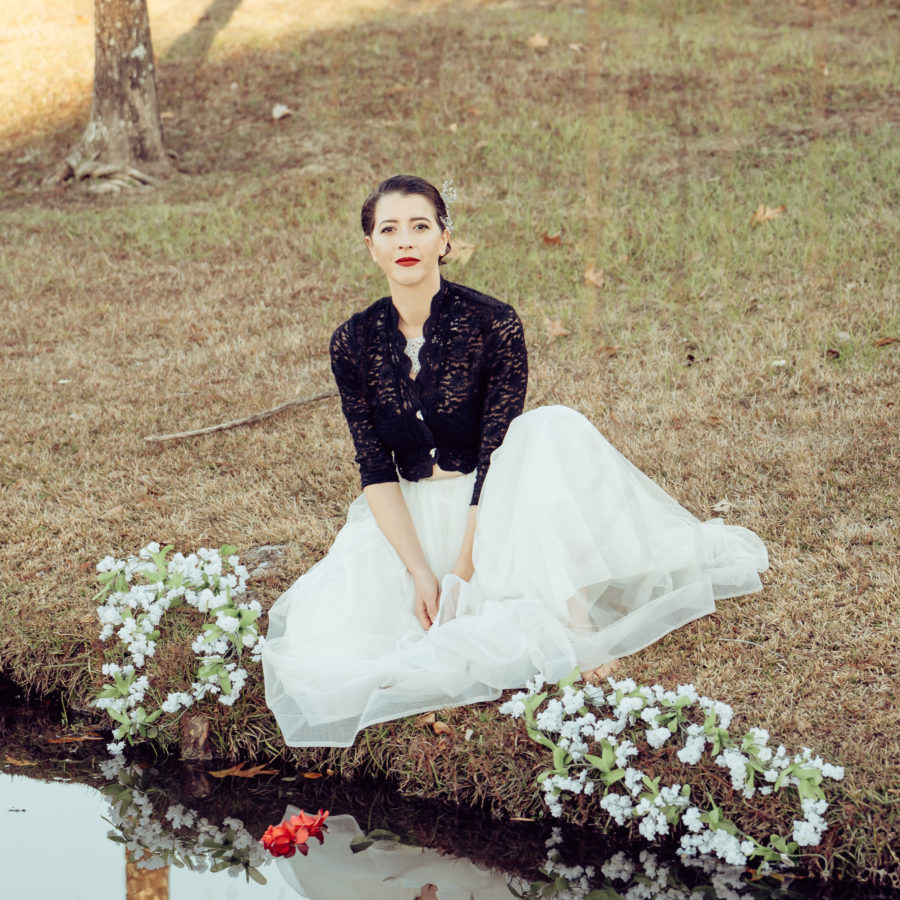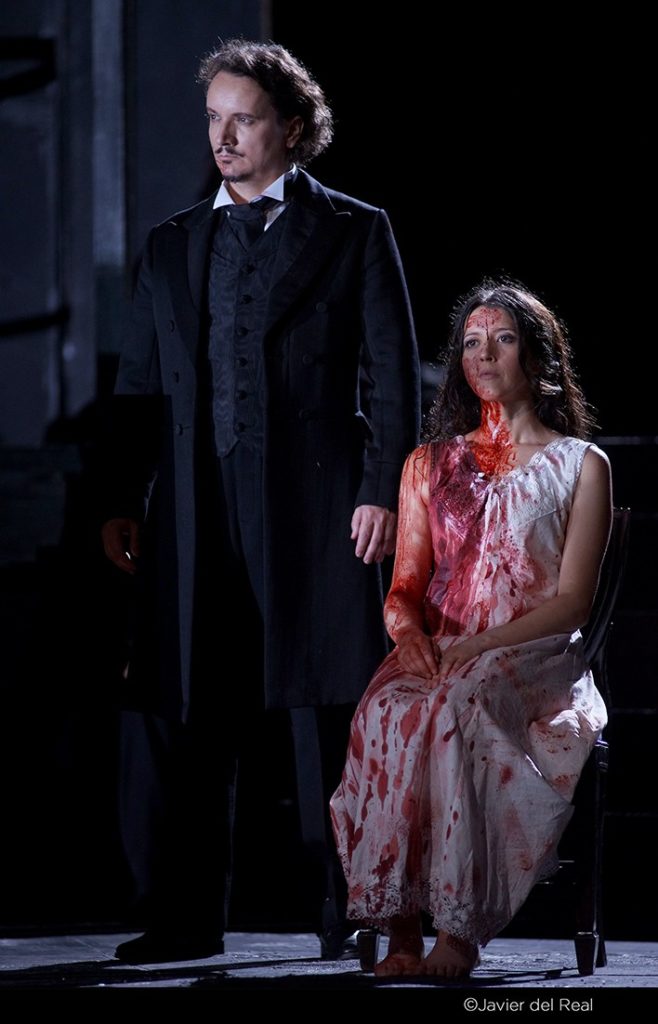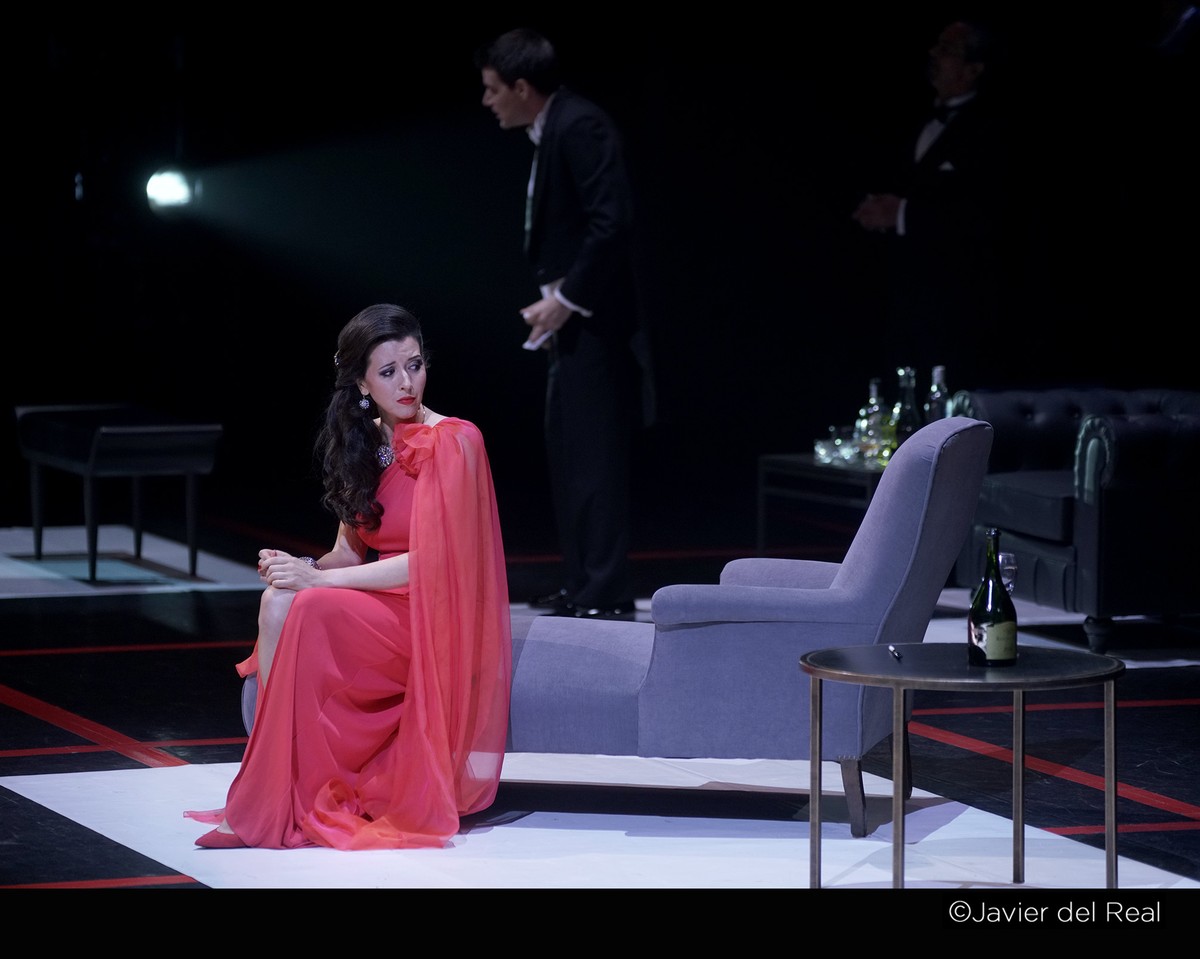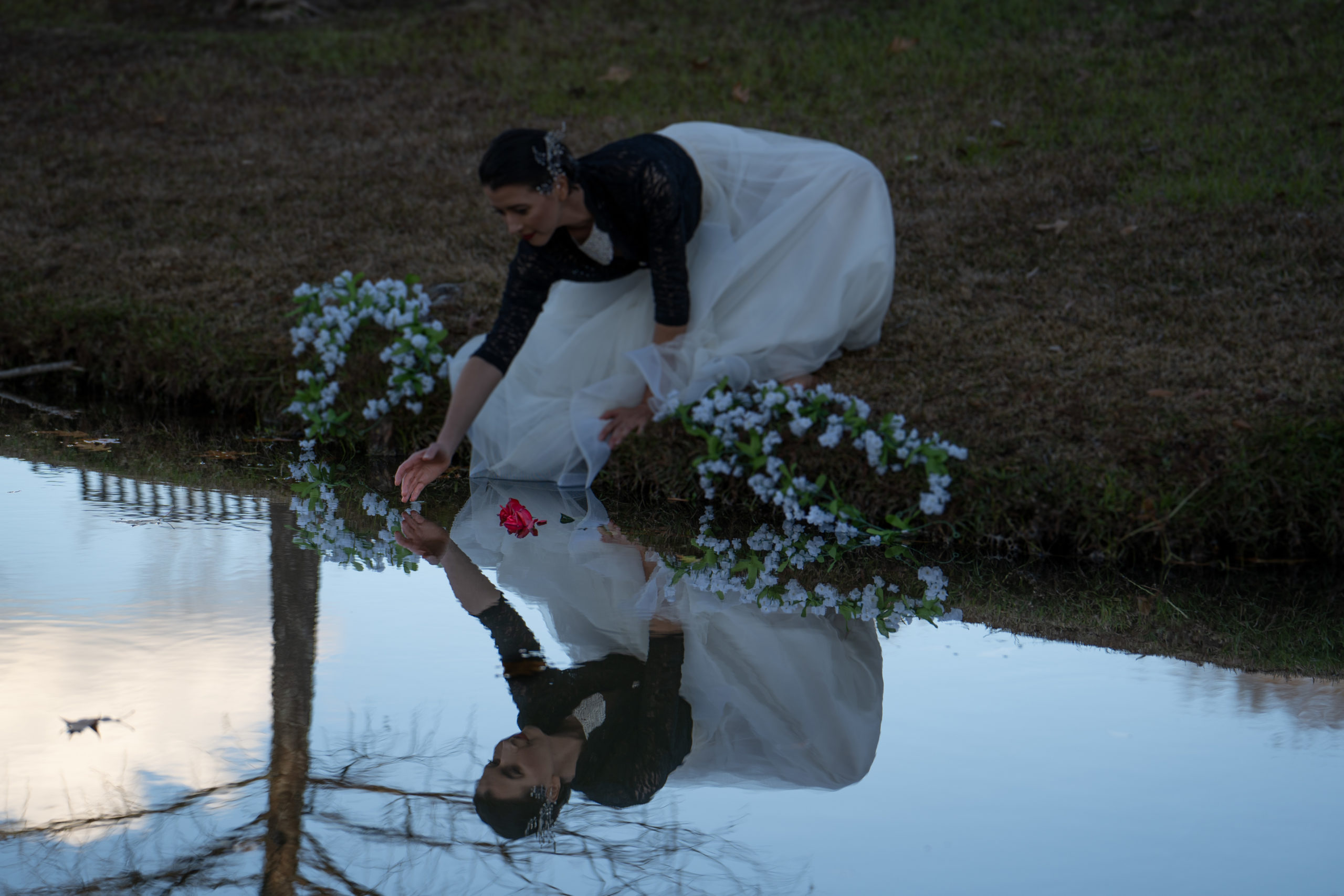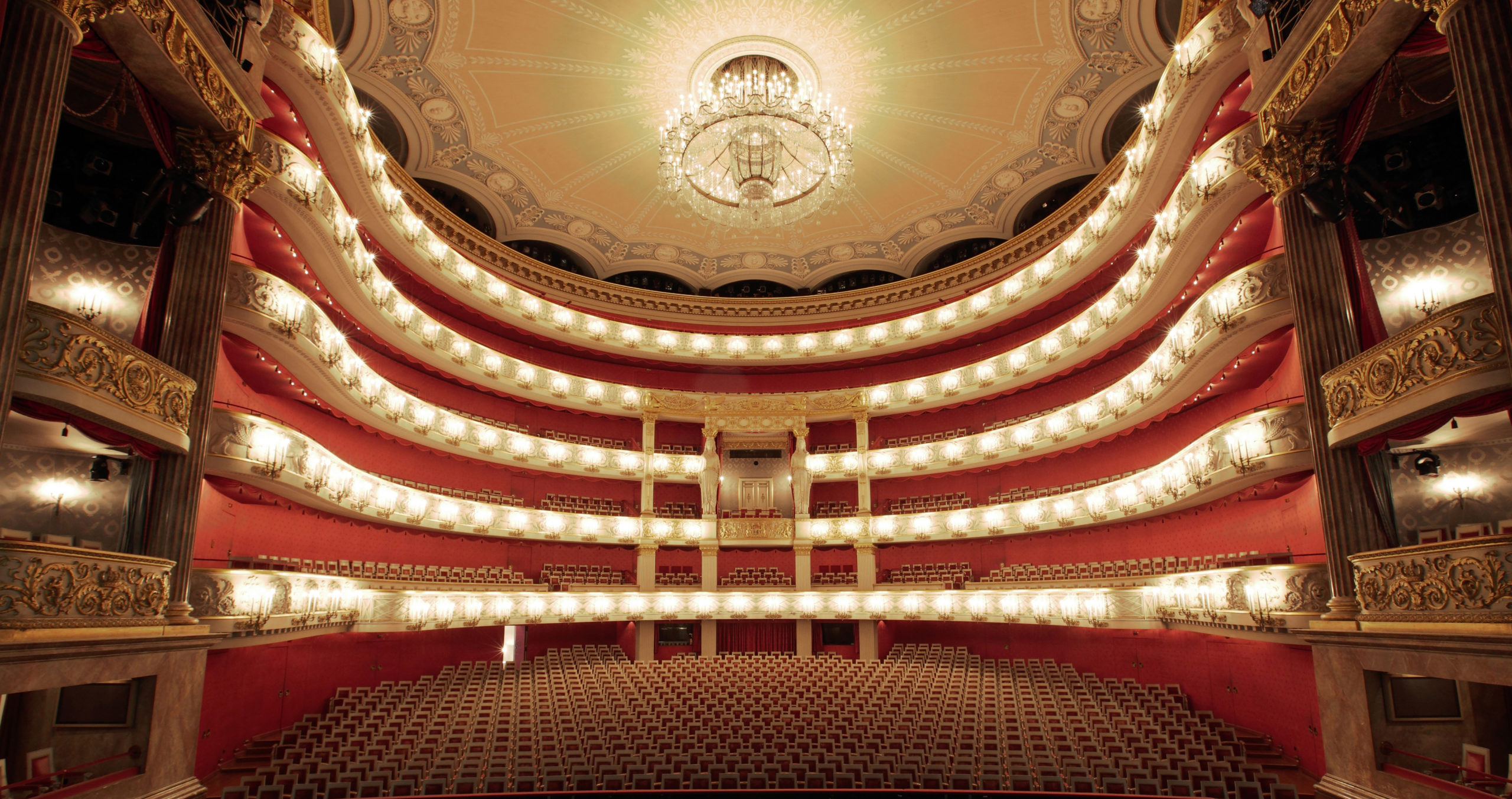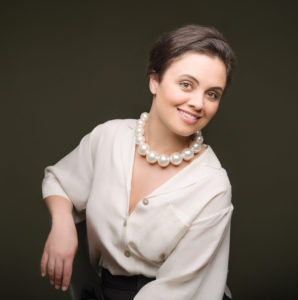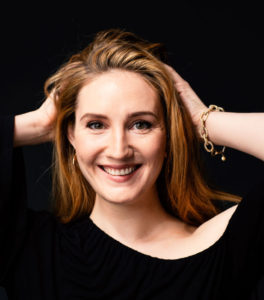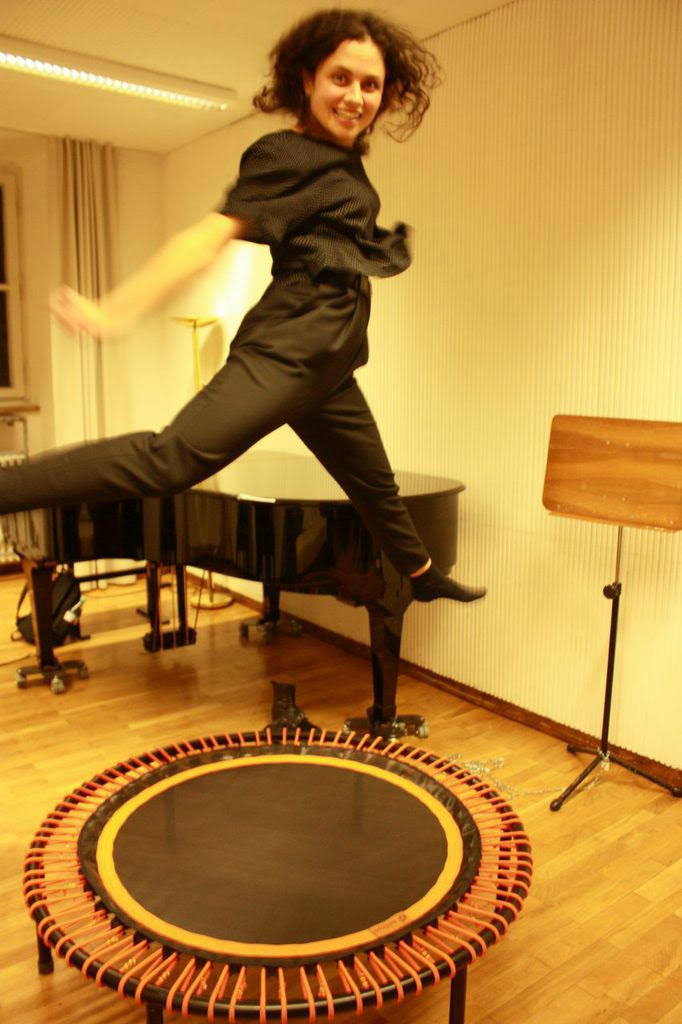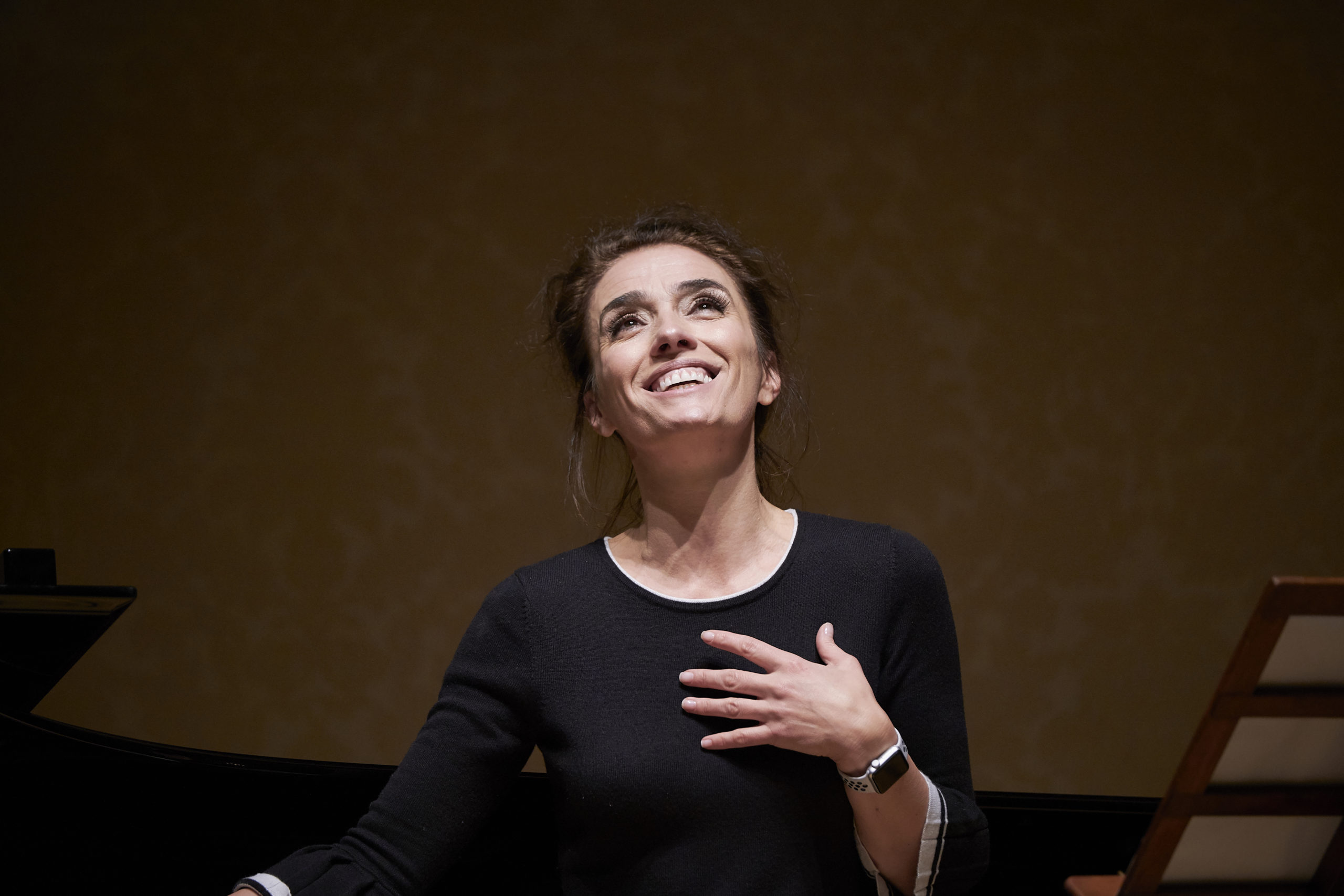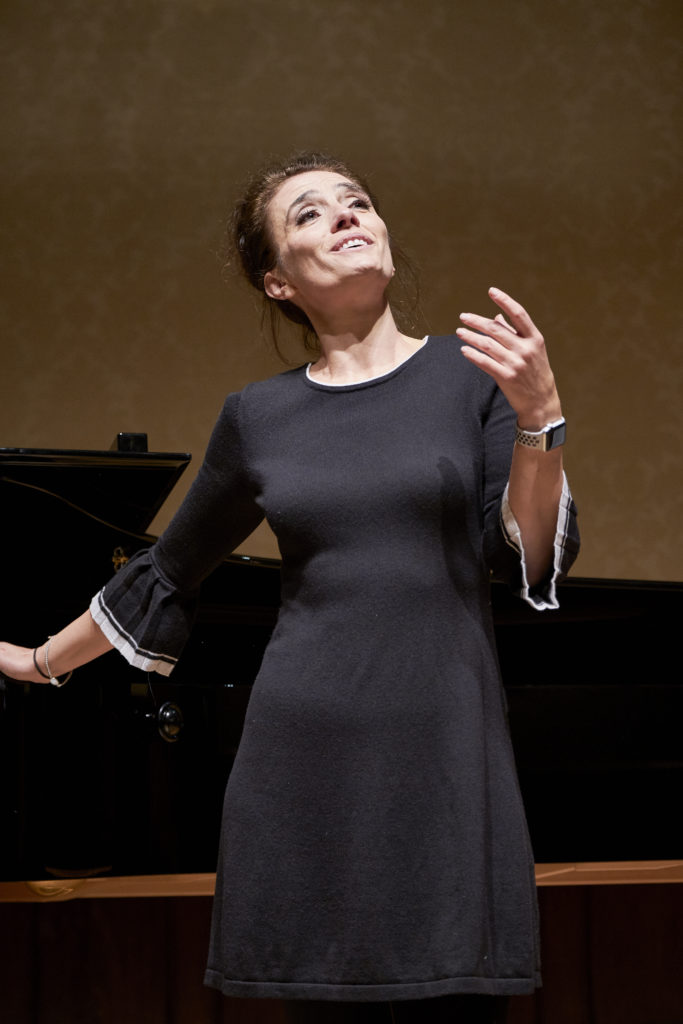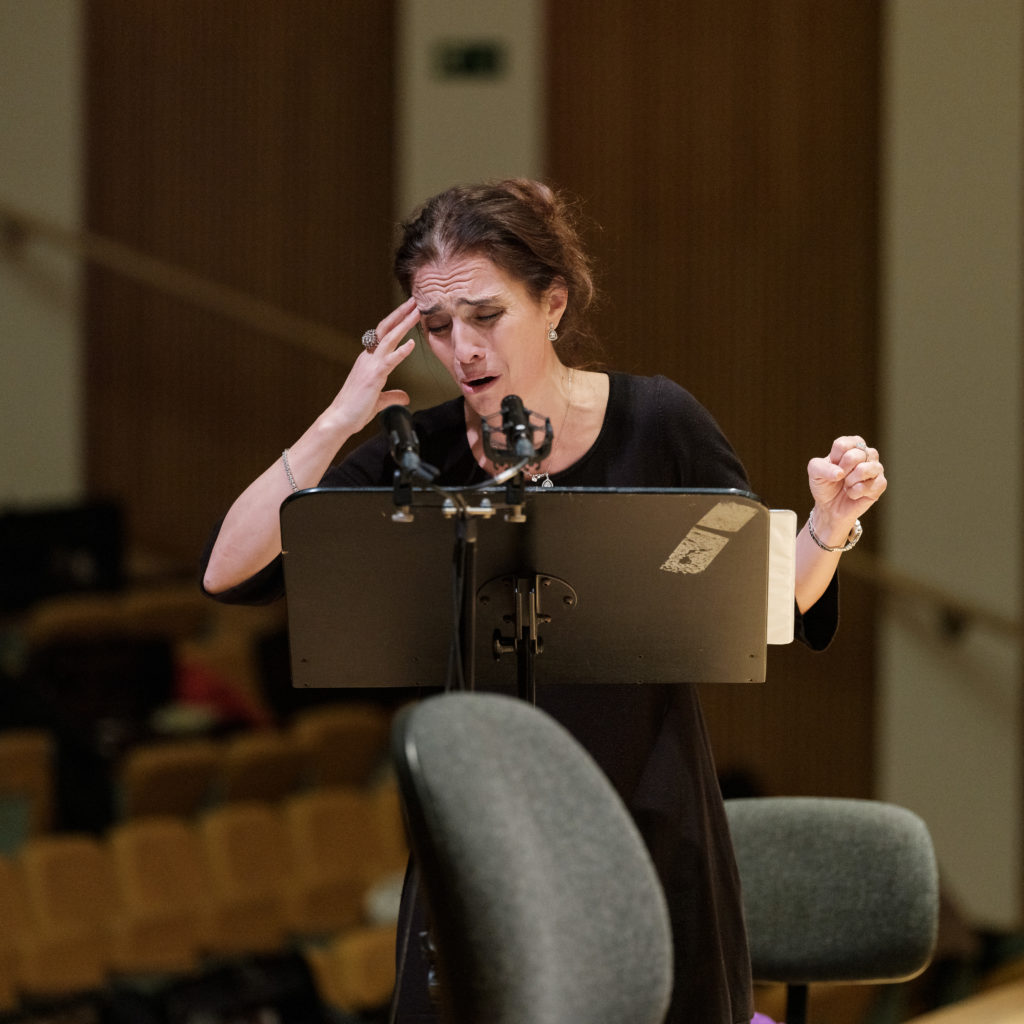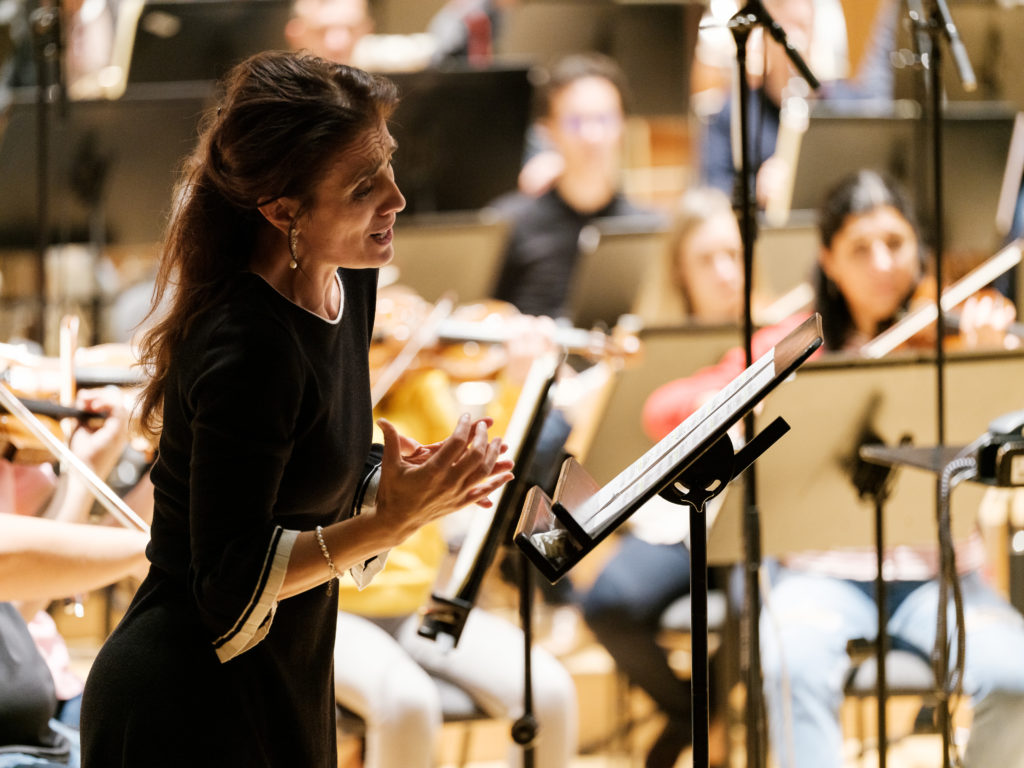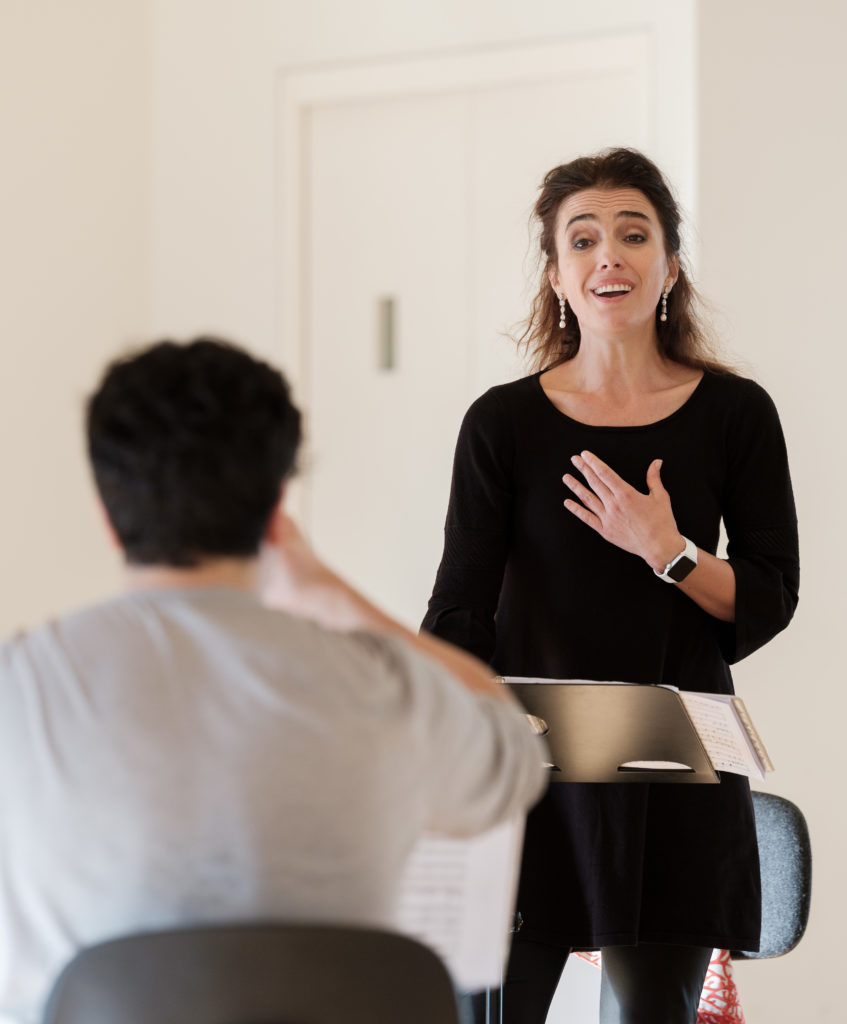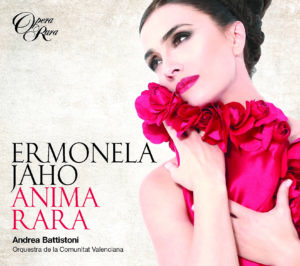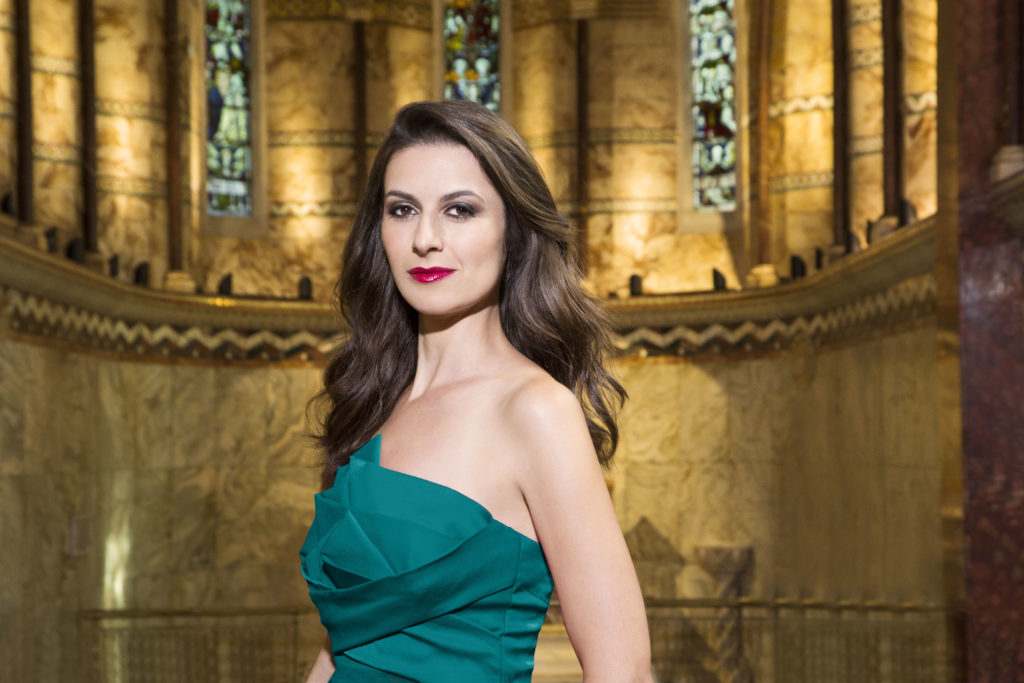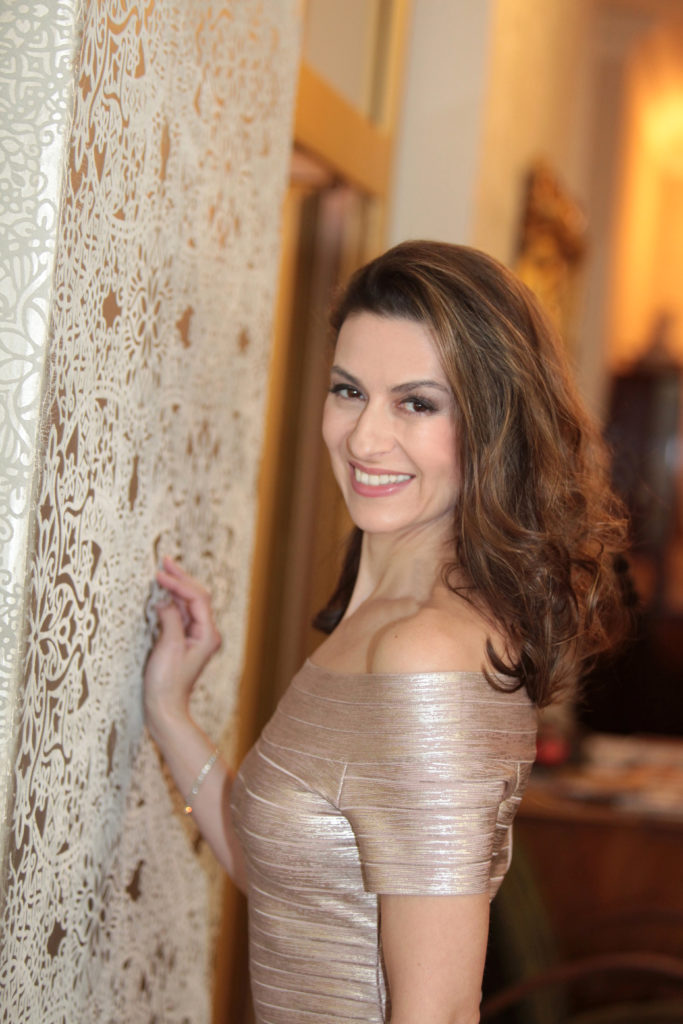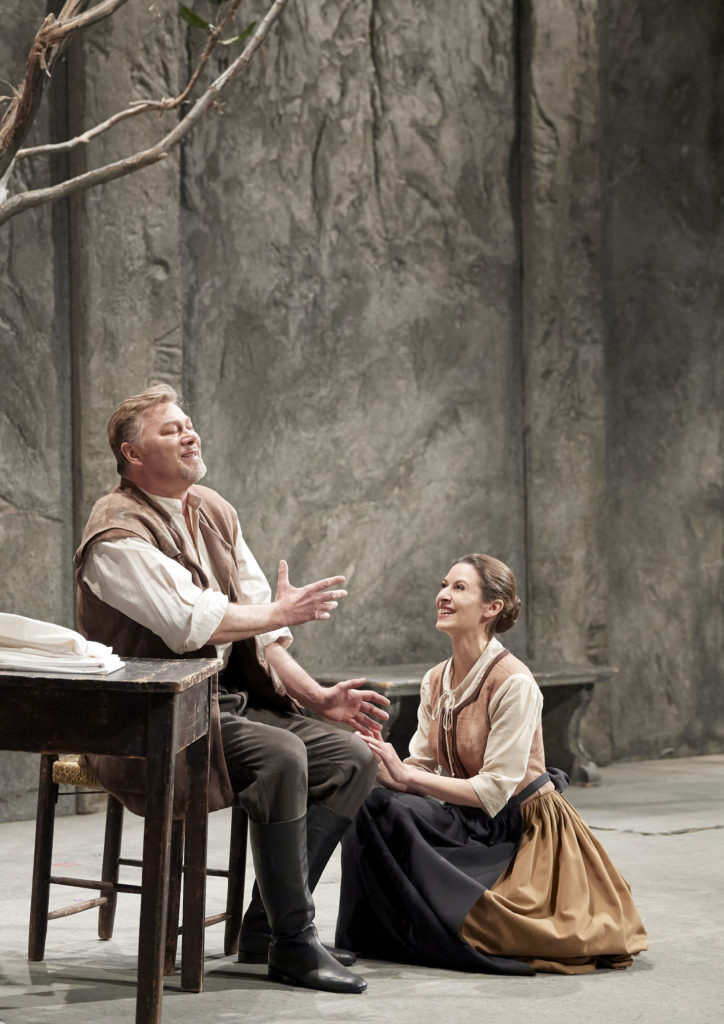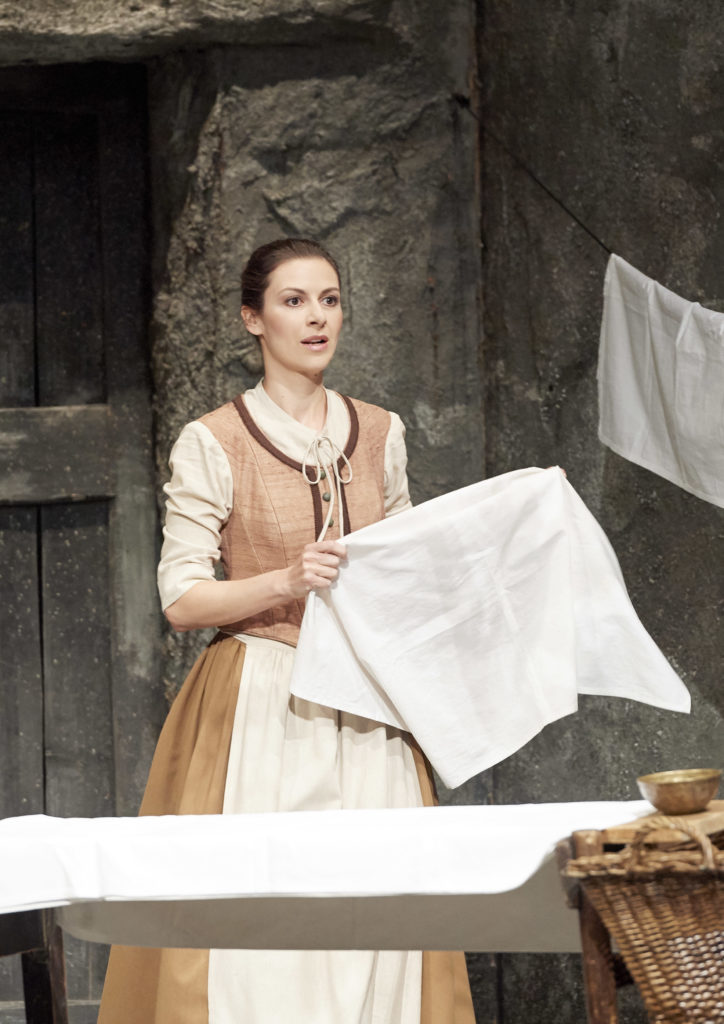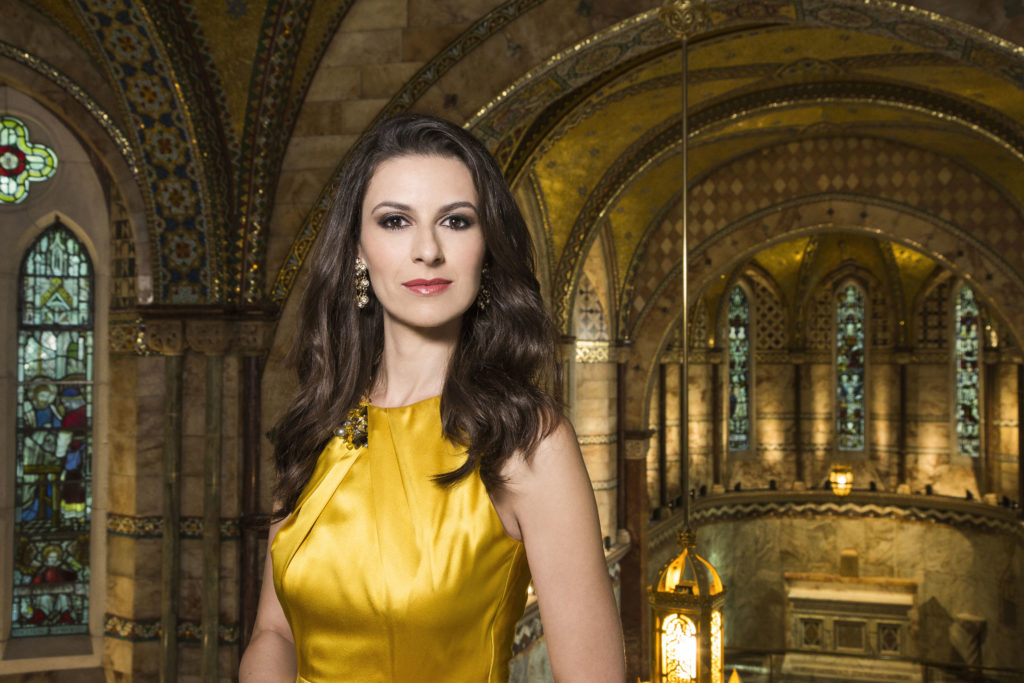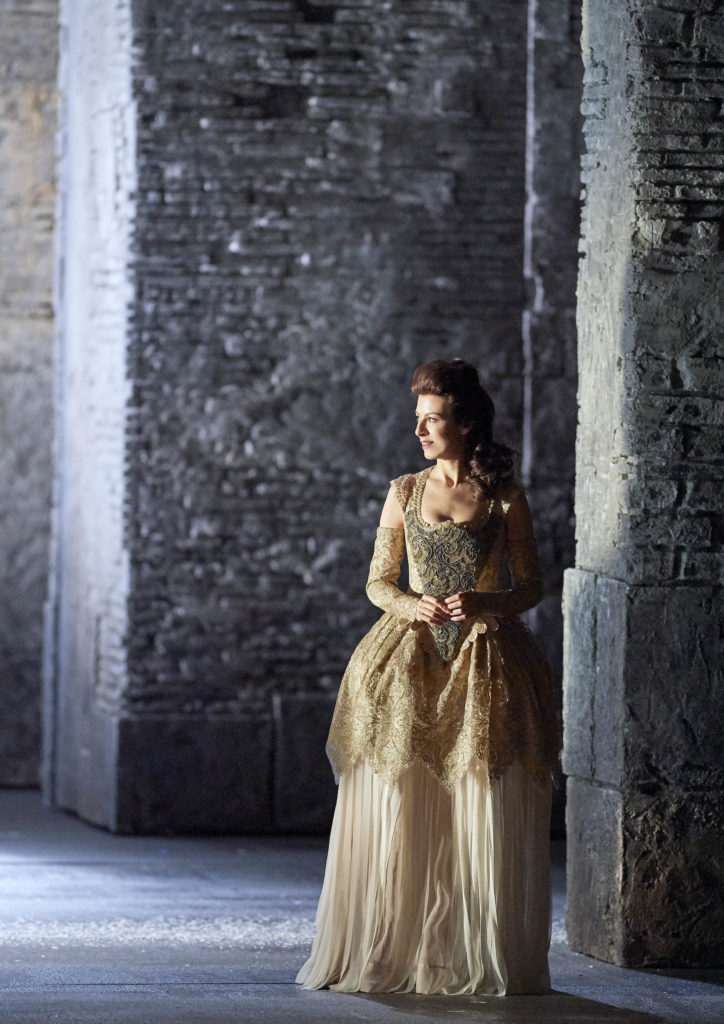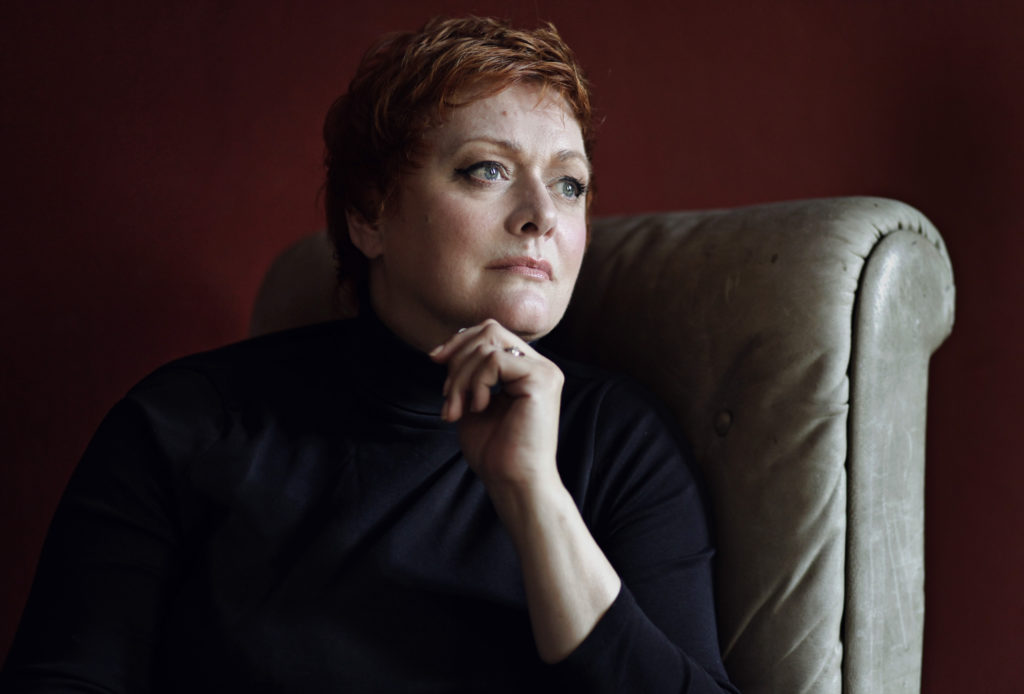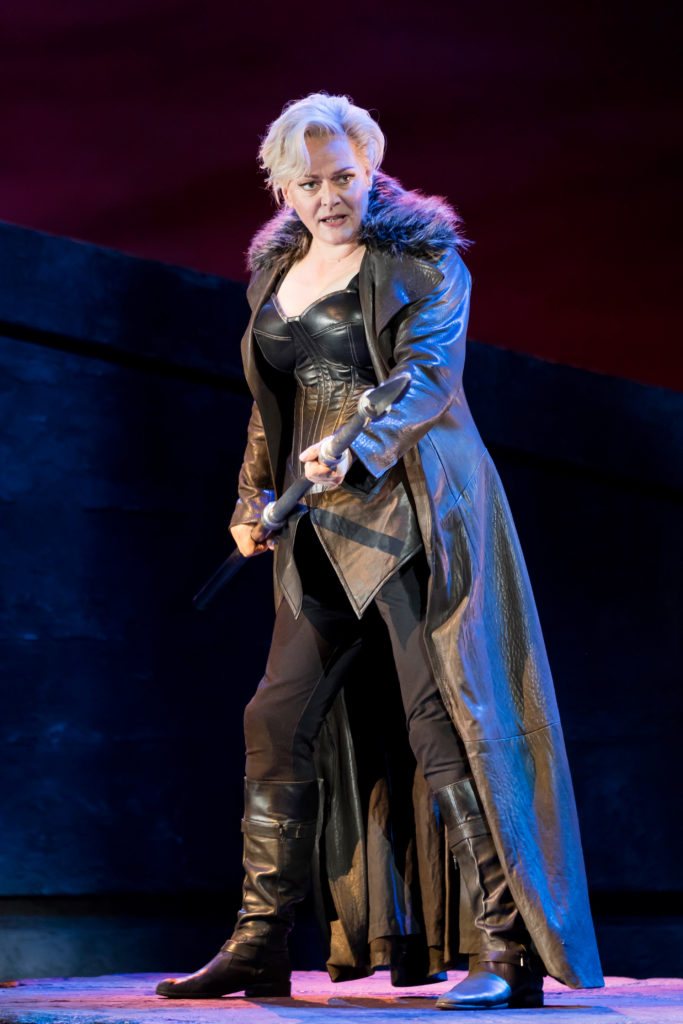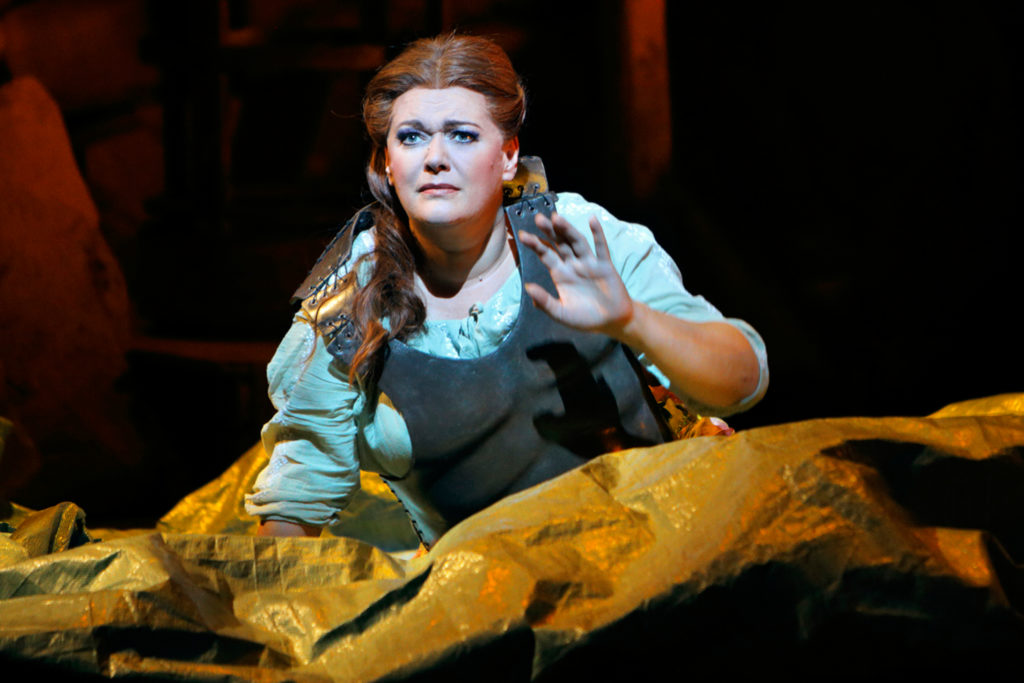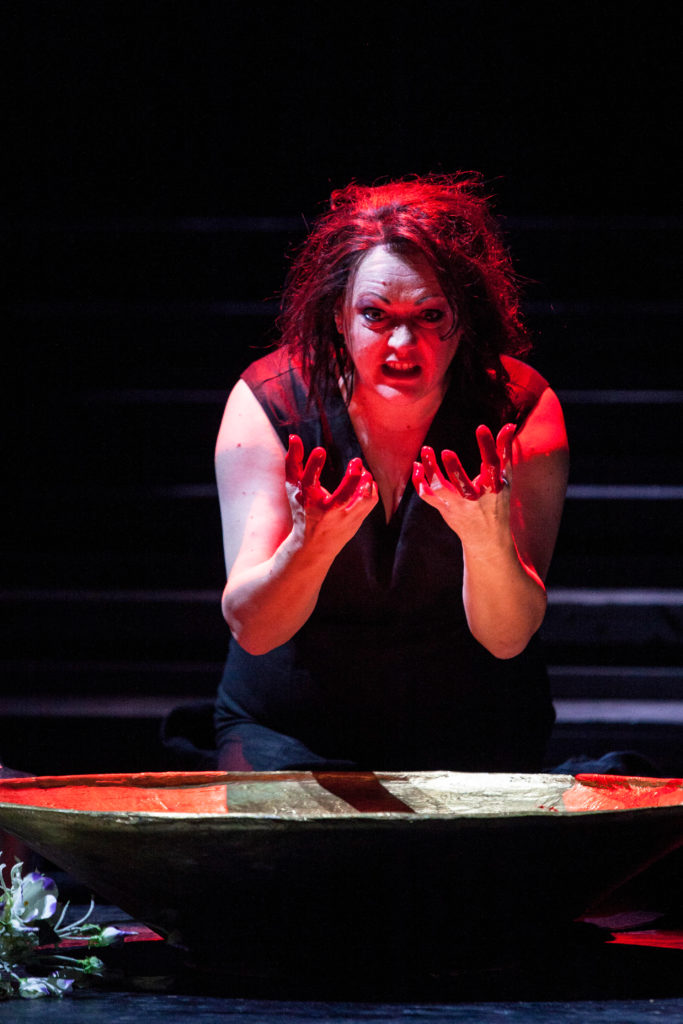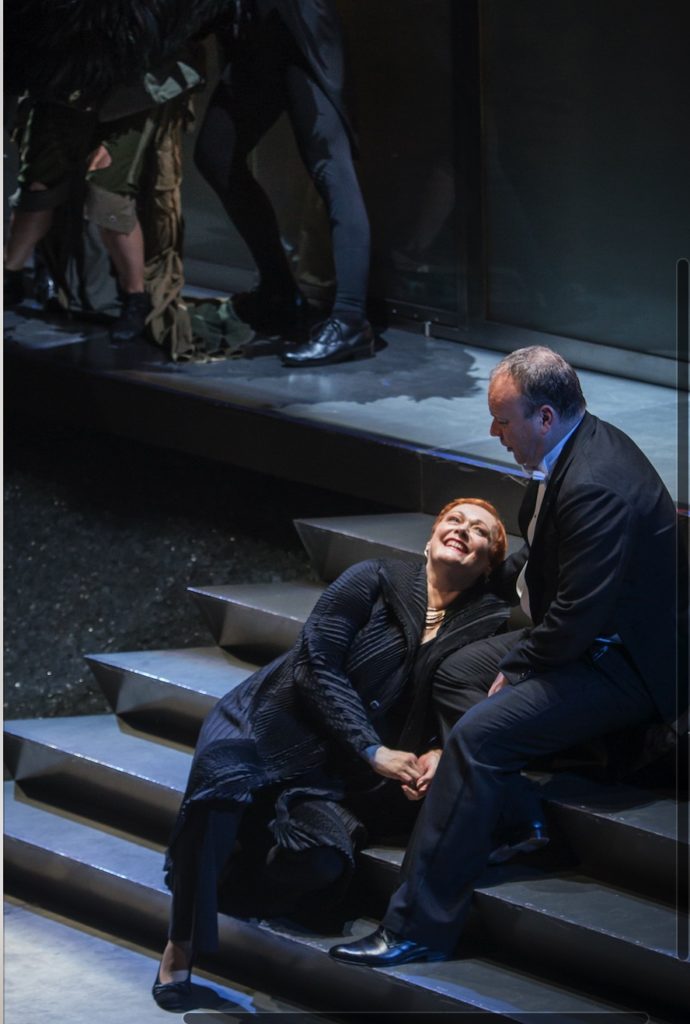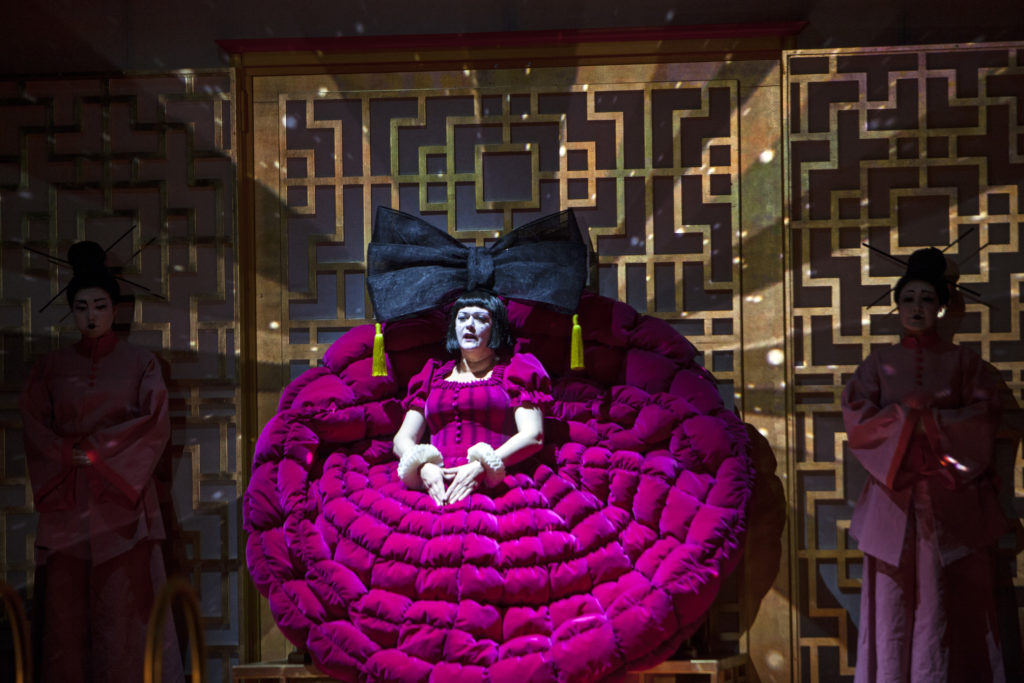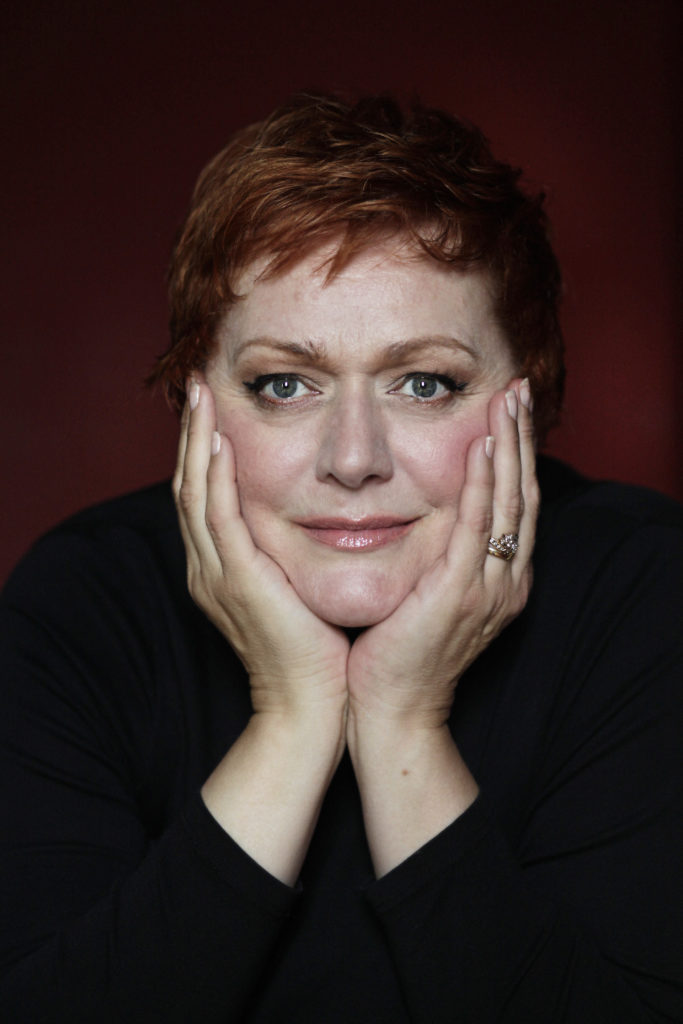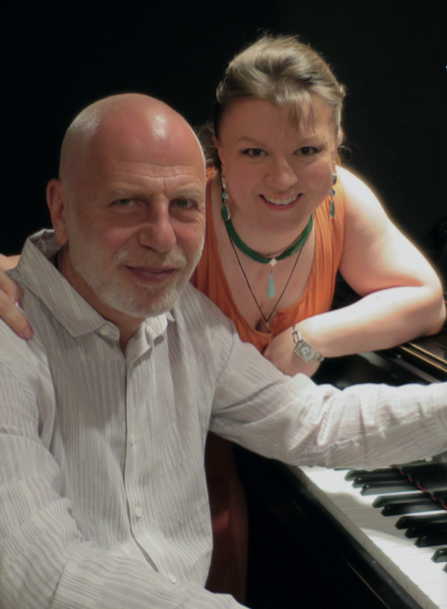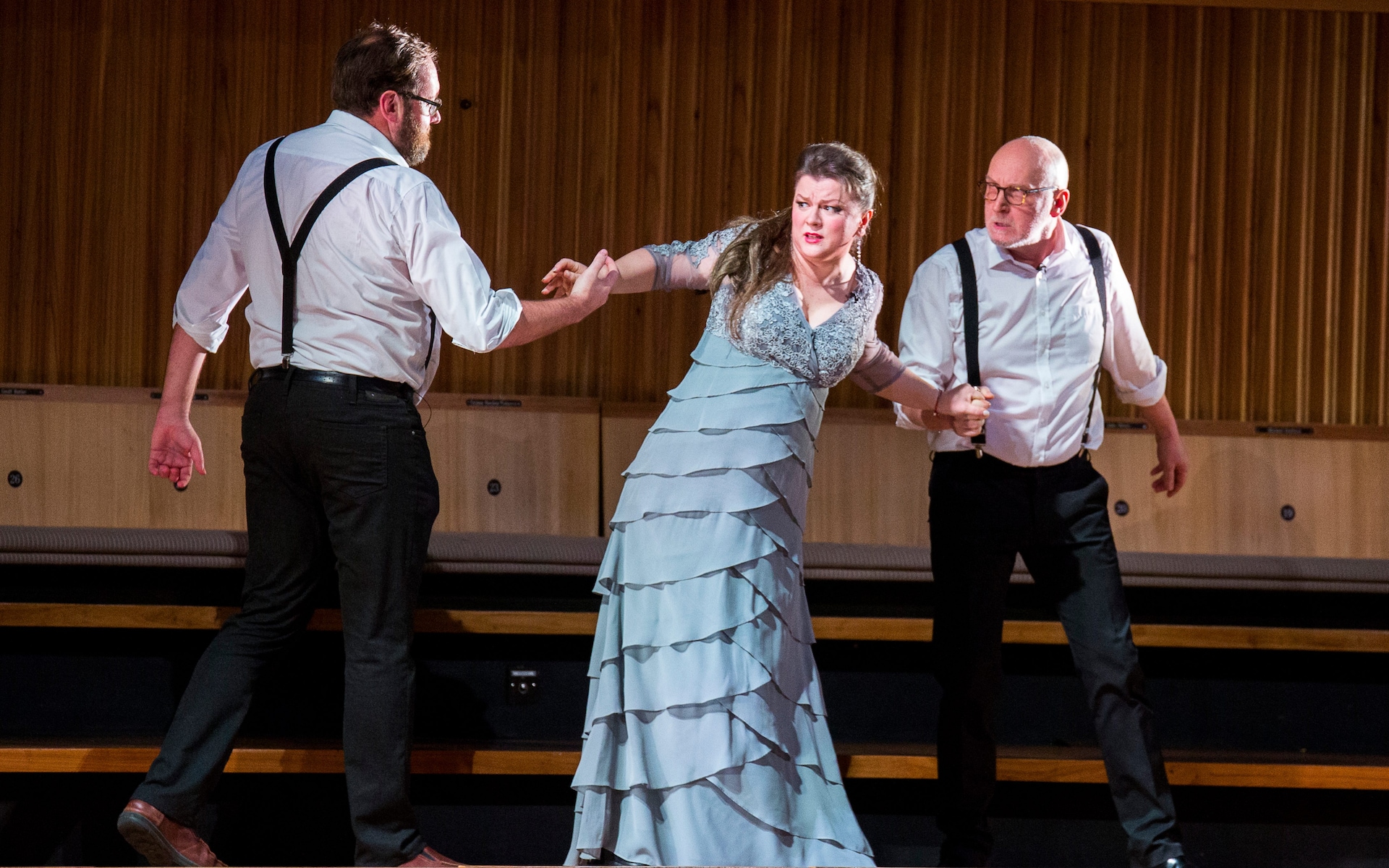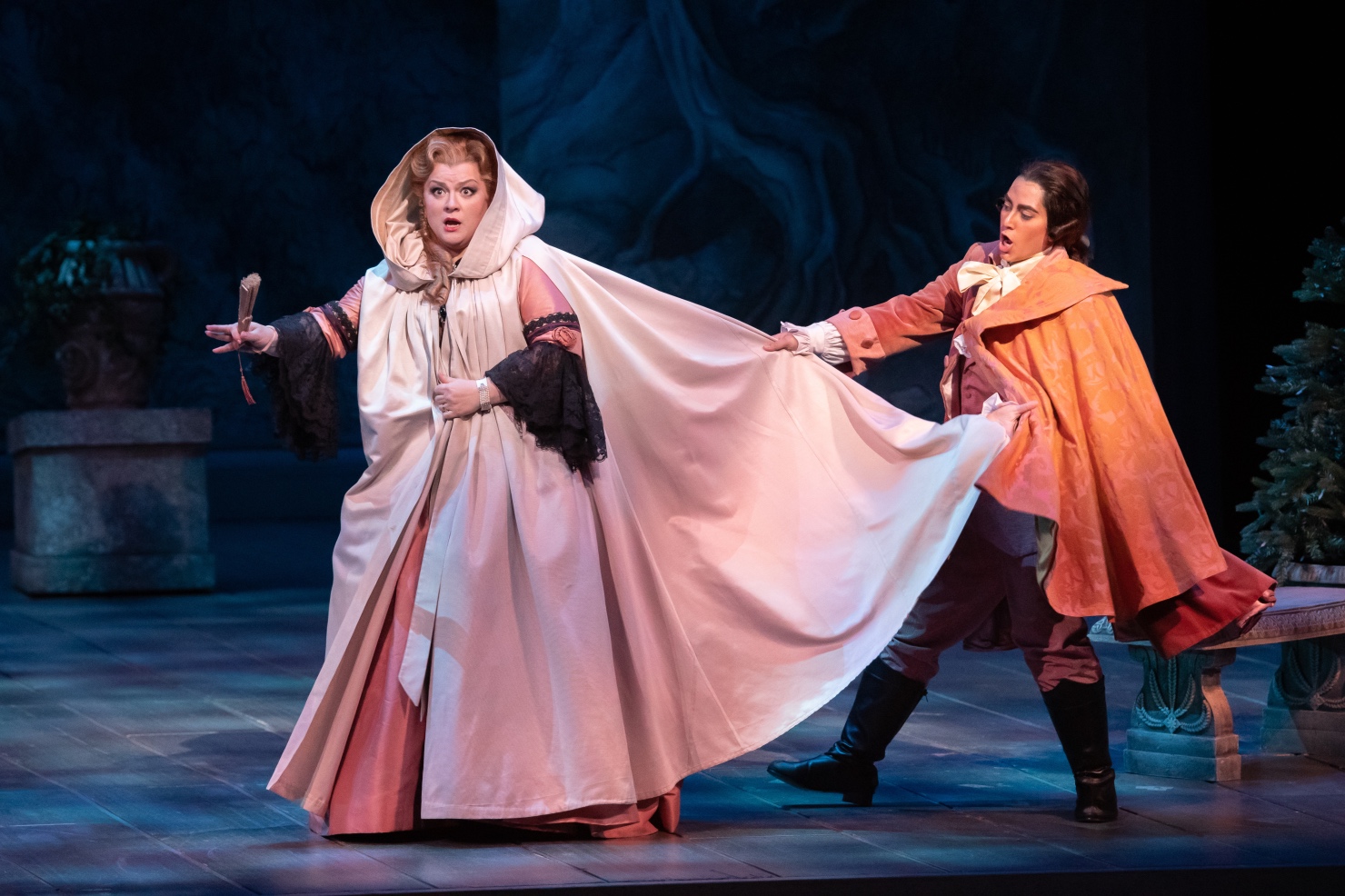Where do music and joy meet? Where can they meet, especially in sad or difficult circumstances?
I came away from a recent conversation with Fleur Barron and Axelle Fanyo pondering these questions. The mezzo soprano and soprano, respectively, are front and centre on Adriana Mater, the second opera by Kaija Saariaho, recorded in San Francisco in 2023 and released in a world premiere recording by Deutsche Grammophon in late August of this year. The opera, which unfolds over seven interrelated tableaux, carries themes of conflict, violence, hatred, and ultimately, forgiveness. Barron (who sings the title role) and Fanyo (who sings the role of Adriana’s sister Refka) heroically carry the work through its epic moments, but they shine brilliantly in its more intimate ones as well; the scenes featuring the pair are shot through with a touching closeness, one that goes beyond the performative. Real friendship, ferocious authenticity, dancing joy – these things matter to these artists, and it’s palpable throughout the recording, if not their entire respective oeuvres.
Barron, who is mentored by soprano/conductor Barbara Hannigan, has appeared with Garsington Opera, Opéra de Monte-Carlo, La Monnaie/de Munt, Opéra National de Montpellier, Opéra National du Rhin, Opera de Toulon, Arizona Opera, as well as with the Berlin Philharmonic, Orchestre de Paris, the BBC Symphony Orchestra, the Chicago Symphony Orchestra, the Malaysian Philharmonic, Junge Deutsche Philharmonie, the Netherlands Radio Philharmonic Orchestra, and the Orquesta Sinfonica del Principado de Asturia, of which Barron is currently Artistic Partner. She recently performed Mahler’s Des Knaben Wunderhorn with Nathalie Stutzmann and the Atlanta Symphony and this season performs Das Lied von der Erde with Daniel Harding and the Bavarian Radio Symphony Orchestra. She will also be performing in six American cities next year on a recital tour with pianist Kunal Lahiry. Another regular piano collaborator, Julius Drake, is set to join her for concerts in London, Amsterdam, Stuttgart, Madrid, Manchester, and Oviedo.
Fanyo, who was a member of Renée Fleming’s Song Studio at Carnegie Hall in 2019, was named by the European Concert Hall Organization (ECHO) program as a Rising Star for the 2023-2024 season, and gave related recitals in a number of celebrated European venues including the Musikverein (Vienna), the Elbphilharmonie (Hamburg), the Philharmonie de Paris, Amsterdam’s Concertgebouw and London’s Barbican. She has sung with Opéra Grand Avignon, Grand Théâtre de Genève, Le Concert Spirituel, Les Talens Lyriques, Opera de Toulouse, Opera de Lyon, and given recitals at Wigmore Hall, La Seine Musicale, the Orangerie du Parc Bagatelle, Festival des Nuits Romantiques, Opéra Comique and the Musée d ‘Orsay. This coming season Fanyo makes her debut as Madame Lidoine in Poulenc’s Les Dialogues des Carmélites at the Opéra de Rouen Normandie, and as Massenet’s Thais at the Teatro Nacional de São Carlos in Lisbon; she will also be singing the title role in Tosca with Théâtre Imperial de Compiègne, with whom she debuted in 2023. Her recital appearances include dates at the Amsterdam Concertgebouw’s Mahler Festival with pianist Julius Drake and London’s Wigmore Hall with Kunal Lahiry.
Barron and Fanyo first worked together in autumn 2022 in Paris, but it was with Adriana Mater the following year that the bond seems to have truly solidified. The opera made its debut in 2006 at Opera nationale de Paris, directed by Peter Sellars and conducted by Esa-Pekka Salonen, a longtime friend and collaborator to the composer; the director and conductor would eventually reunite for a semi-staged presentation with the San Francisco Symphony. (Sellars had already led the American premiere of the work back in 2008.)
But this 2023 presentation, was different, and not only because it marked the work’s West Coast debut; Kaija Saariaho was seriously ill during rehearsals, and passed away at her home in Paris on June 2nd. The loss was magnified by the proximity of her family and closest friends in San Francisco – Saariaho’s daughter Aliisa Neige Barrière was assistant conductor for the production – and the cast, which also included Nicholas Phan and Christopher Purves, became thusly imbued with a deep sense of responsibility toward the material. Barron and Fanyo, hardly strangers to demanding work, recalled the unique challenges of the situation (the rehearsal room apparently filled with boxes of tissues) as well as its singular joys (including laughter-filled voicemails). The hard work paid off, with both singers receiving critical acclaim for their performances. Opera Today‘s Michael Milenski hailed Barron as “a formidable technician of deep musicality and has a powerful stage presence, transforming herself from the sexually ripe young woman into the mature woman who must explain herself to her grown son” while Milenski praised Fanyo, “(o)f rich voice and impeccable technique, she negotiated the treacherous vocal lines created by Mme. Saariaho with an ease that made such atonality of line seem natural.” The pair are set to reprise their roles in Teatro dell’Opera di Roma’s presentation of Adriana Mater in 2025.
Fleur Barron and Axelle Fanyo were kind enough to share their thoughts on being part of the San Francisco Symphony presentation and how their friendship aided in the work’s realization; during our recent exchange they also offered unique individual perspectives on working with both Salonen (“E.P.” for short) and Peter Sellars, as well as pianists Julius Drake and Kunal Lahiry. Importantly: they shared thoughts on balancing light and dark elements within recital programmes; and why joy, authenticity, and music are interlinked.
“In Our Lives Forever”
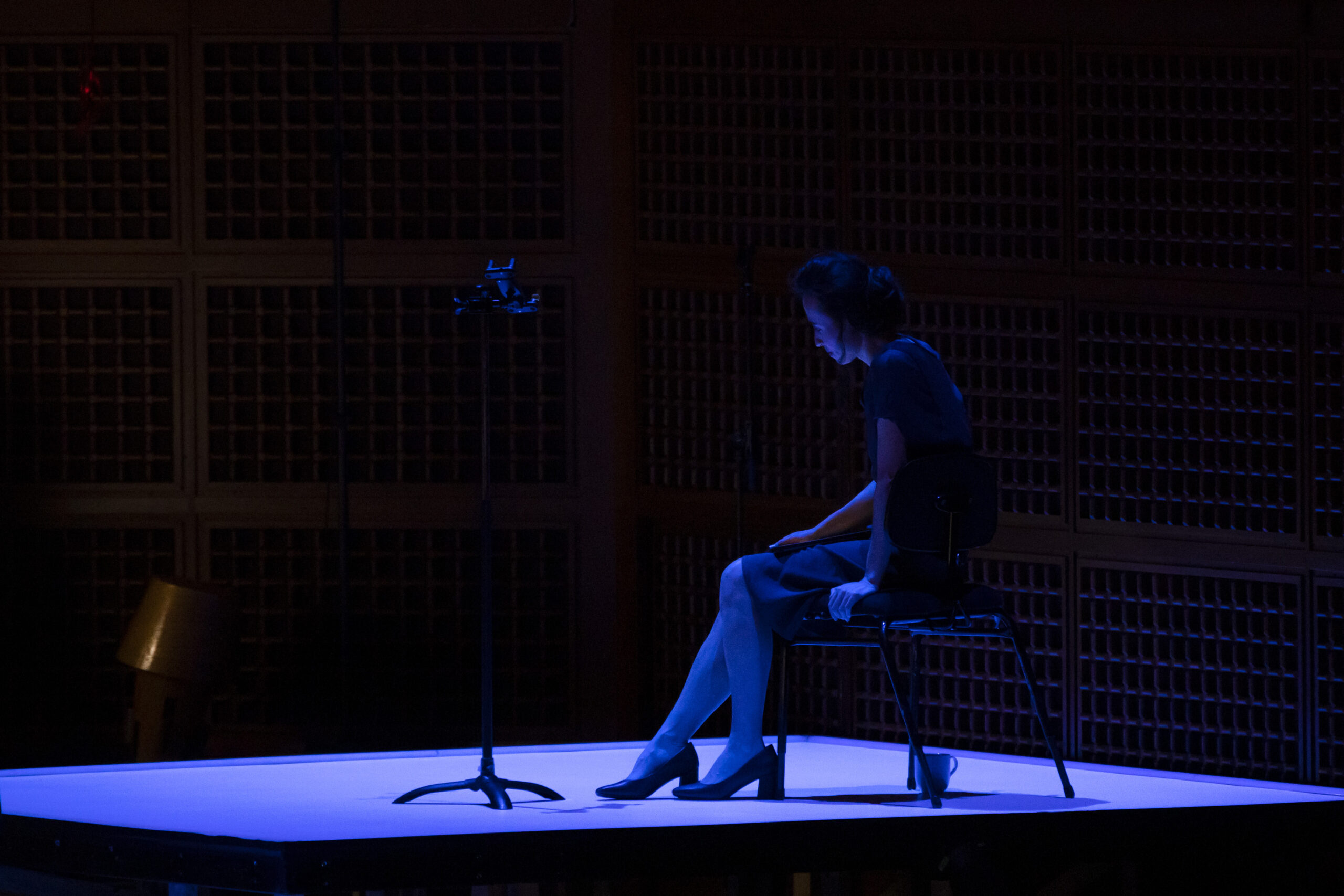
Fleur Barron in the 2023 San Francisco Symphony presentation of Adriana Mater by Kaija Saariaho. Photo: Brittany Hosea-Small
How did the opportunity to be part of Adriana Mater come about?
FB Adriana is a little bit of a niche project for sure, but it’s an important project to have out there. I think one of Kaija’s dying wishes that it be recorded, and E.P., as her close collaborator and friend for so many years, really wanted to honour that. It’s a very personal project for him and it was a very intense experience for us, one of those things that will be a defining professional and personal moment in our lives forever. Throughout this very intense two-and-a-half-weeks, it was just the four of us, two guys and two girls, with Peter Sellars, E.P., and Aliisa (Neige Barrière), who’s Kaija’s daughter and was the cover conductor – that was it. The writing is in that is not easy: in the first half my character is raped and in the second half, I suddenly have a son and I’ve aged twenty years. And it’s set in a time of war. The relationship between the two sisters is really not easy; the relationship between Adriana and the son is also really not easy either. And the piece is reflecting the external violence and conflict happening and alluded to in the text. This piece is a lot – I can tell you we all had meltdowns on different days; we had to be so open and vulnerable, all the time.
Adriana Mater wasn’t the first time that both of you sang together…
AF No it was not! We met here in Paris for Debussy’s La Damoiselle élue. When Fleur and I first met it was love at first sight. We are literally like sisters…
FB … and then we played actual sisters on stage later in Adriana, although that relationship is much more dysfunctional! And we have many projects coming up together in the next few years. I think the universe wants us to be doing things together, so it’s really nice for us.
How has working together influenced your individual as well as your ensemble work?

Axelle Fanyo. Photo: Capucine de Chocqueusesm
AF Good question! Adriana has had a lot of influence on my work, especially on my way of interacting with people. Even if I won’t ever find, I think, the kind of connection I have with Fleur – because it’s really unique and special – I’m always trying to see the human behind the artist, as much as possible now. That approach has been really helpful in order to do better work onstage, and also to have a better energy off the stage. I’m always trying to find out a bit more about the people I work with, and I think this is because Fleur and I had such great energy that now it’s really important to me, much more than it was before.

Fleur Barron. Photo: Victoria Cadisch
FB I would say the same for me. I mean, first of all, as Axelle said, the type of friendship that we have is rare. A lot of time you have what’s called “showmances” – when you’re on a project and you might have a connection but it’s on a temporary basis; I never place expectations on that relationship to endure past the project. When we’re travelling all the time, it just makes the travel life more tolerable when you can have a connection with somebody, however brief. But I think what Axelle and I have is a true friendship, which is unusual. When I say we talk every day, that’s really not an exaggeration. This profession is hard, everyone manages their ego differently; jealousy is a normal thing. A unique feature of our relationship is that we are really not competitive – it’s so great because when amazing stuff comes along we immediately share with each other and there’s never a worry like, “Is this person secretly feeling insecure?” We also talk about things unrelated to the job, but it’s just good knowing who your support system is, especially when you’re on the road. There are a couple of people, like another friend of ours, Kunal (Lahiry), who you really know are in your corner, who you can reach out to, who have your back. It’s such a unique thing.
Salonen & Sellars: Balancing Elements
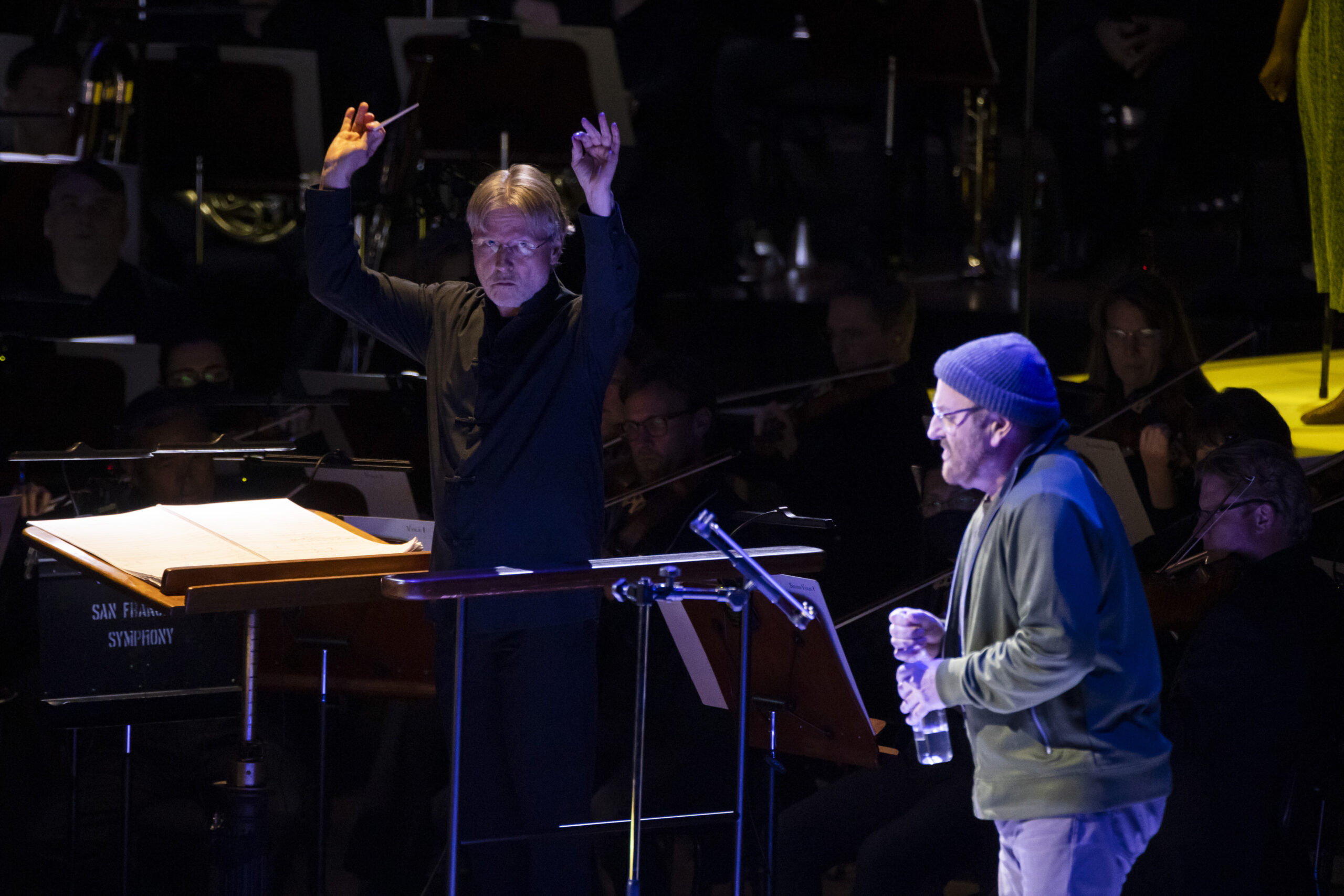
Esa-Pekka Salonen (L) leads baritone Christopher Purves (R) and the San Francisco Symphony in the 2023 presentation of Adriana Mater by Kaija Saariaho. Photo: Brittany Hosea-Small
What kind of direction did you get from Salonen throughout rehearsals and performance?
AF When we do projects we have a lot of in-between projects. So we need to go from Debussy to something else entirely – it can be really different worlds. With La Damoiselle élue it was a pretty magical thing, with beautiful music and beautiful text, and it was all about being a young girl and experiencing love – really the opposite of Adriana! And it was not staged or semi-staged like we were doing with Adriana in San Francisco. In terms of working with E.P. – he is not a big note-giver, it’s more like you get a sort of energy and feeling from him; if you don’t get something he’s going to be like “Let’s tweak and try it one more time.” You just have to feel the flow and stay in it. With Adriana, because it’s contemporary music, you have to be exact – and because it was Kaija’s work so he gave us some wee little notes but he was really focused on the overall energy of the orchestra. Working with him was a dream – I must say, I’m such a fan of his! When I’m singing with E.P. I feel like he’s coming inside of my head and he’s very gently saying, “Do this; do that; go here; go there” – and I just have to follow.
FB One salient feature of this experience was of course Kaija’s passing. When we started rehearsals, we intuited she was ill, but we weren’t told how bad things were officially until maybe three or four days before she actually died. It was such an intimate process that we were all sharing, even though we were mostly kind of just meeting and it wasn’t like we knew E.P. well from working with him that one time before – it wasn’t like we were best friends – but there was a sympathetic sort of pain throughout that really informed the process in a very beautiful way but also in a very hard way; we felt like we knew her and we felt it was literally a family affair. We felt the responsibility of that in the work also.
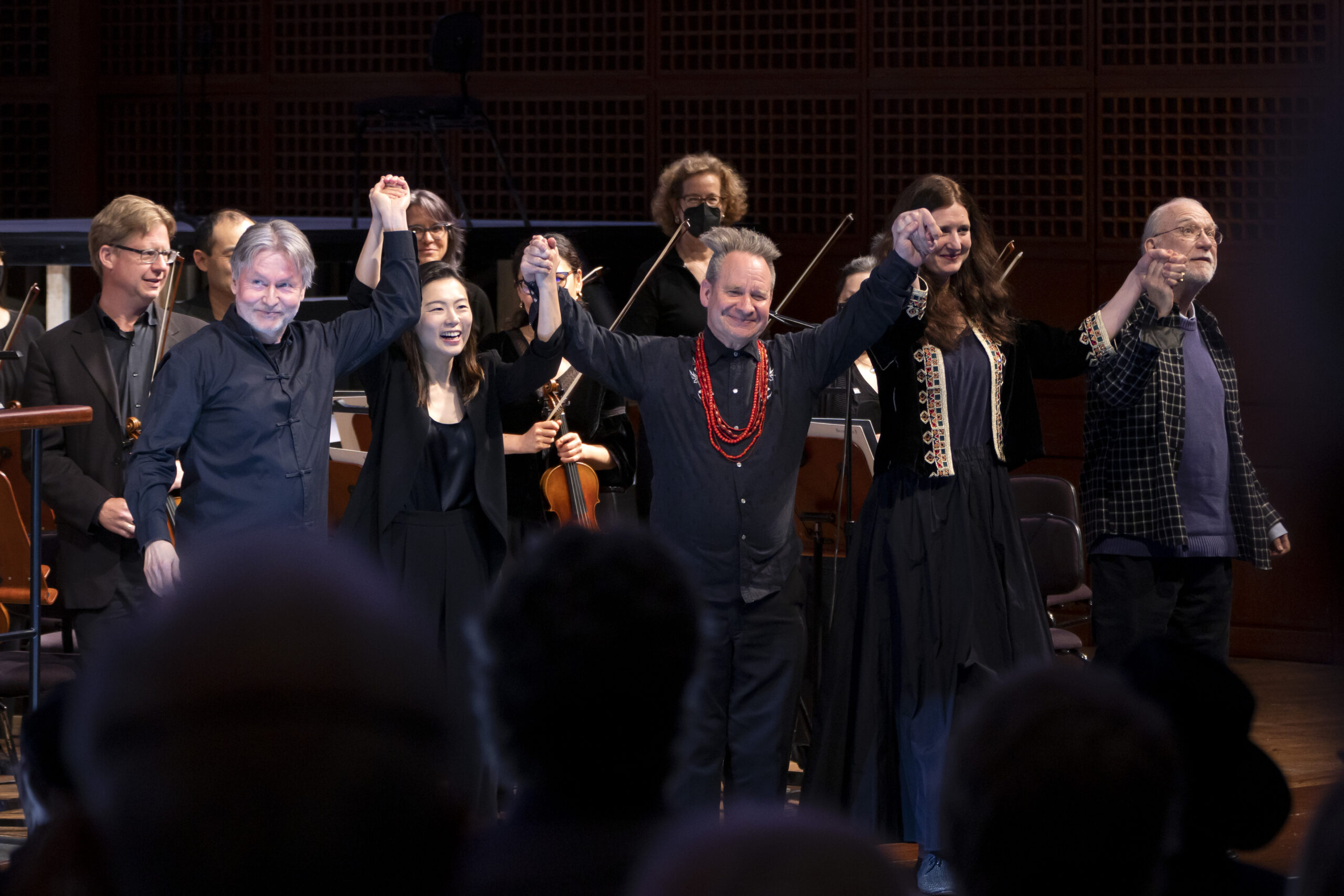
Esa-Pekka Salonen (left) and Peter Sellars (middle; red necklaces) take their bows at the close of Adriana Mater with San Francisco Symphony in 2023. Photo: Brittany Hosea-Small
As to E.P., he is an amazing architect – he kind of controls time and space. He has a plan, and you feel like you’re in the flow of his master plan. I feel like he’s like the eye of the storm: he has a very calm centre when he’s conducting and you can see that he has the 360-degree vision for the balance, the singers, the orchestra, everything. It’s a hard score, and we were quasi off-book, and doing staging; the orchestra, because we were semi-staged, was behind us, instead of the typical concert version where you are next to the conductor or they’re in front of you. There were many things to navigate, but the type of leadership he has is really beautiful because it’s never angry, never punitive if you mess up. You feel his energy; it’s not about lots of notes all the time, It’s about the clarity of intention and exactitude he brings through his gestures, his presence, his aura. Personality-wise he’s in total contrast to Peter, who started rehearsals with a ten-minute hug and an offering of gratitude and cried every day with us – but that’s also totally authentic to Peter. Axelle and I both have very sensitive bullshit metres and we both found Peter to be this very beautiful, deeply empathetic person.
AF Peter is extremely perceptive – he’s taking in information about you and the dynamics in the room all the time, and he will say subtle things to you. He expects you to offer a lot – it’s not he’s not telling you what to do with the character but he carefully sits and observes. I’ve never worked with anybody else who does what he does, but whatever he does is effective – really effective. For me, he really helped me process some personal stuff through my role, because he understood something about me – he saw things I would do, and would make observations and I would be like, “Wow, you are a genius.”
On Cherished Collaborators
You both collaborate often with Julius Drake and Kunal Lahiry – what is it about them as collaborative pianists that you particularly find rewarding?
FB I’m so indebted to Julius because really, he plucked me out of a young artist program, the Britten Pears Young Artist Program, and it is entirely thanks to him that I have a career in chamber music. I mean, now the thing flows on its own, but in the early days, it was and still is very hard to be a recitalist, and it sometimes takes an important influential figure to give you those opportunities in order to get you on your way. And one of the things, and so one of the hallmarks of both of those people, of both Kunal and Julius, is generosity; it is very rare. But they are both very generous, in terms of their approach to the business and how they are onstage. Axelle and I have talked about this of course, and something we both love about Julius is that he has a very meaty, rich soloistic sound; both of us have larger voices than a typical recitalist and that sound helps so much. It’s like a tempurpedic bed where you feel cushioned and supported by the sound and then you can sing.
AF It’s really fun it’s fun to work with people like them – I love both Julius and Kunal because you can have those amazingly passionate, very artistic disagreements and at the end you have these beautiful results, and it’s like, “Whoa I had no idea we could go there!” It’s so rewarding to work both of them.
“I need to feel the fire”
Your recital programs mix serious themes along with humour and lightness; how do you balance those elements, and why is it important to you?
FB There’s often things that I’m reflecting on as a human being, things that I’m interested in exploring through programming, because that’s where we have the most creative agency as artists. I remember three years ago when I started to get more into diverse programming and was having also just a lot of conversations about the changes we need in the industry and asking what does it mean to be an advocate if you’re called upon in that capacity – which I think both Axel and I have been in various ways – and suddenly at one point I thought, my goodness, I’m a very fun loving person and classical music can just be so earnest and so serious! You come onstage and it’s formal – “don’t do this; do that” – there’s the protocol for how things should be. But I just want to be me. And I thought, if I’m not really enjoying myself, even with a serious piece, what is the point? So I thought, “I’m going to build a program that is literally about joy.” I built a program around dance rhythms that uses a pipa, which is a Chinese instrument, and explored folk songs from east Asia, central Asia, Europe, and South America. And so the focus was these folk rhythms, which are very danceable and fun. I wanted to make a program that would help me self-liberate – and post pandemic now, I just have far less anxiety about what people think, so yes, for me, it is a very conscious decision in terms of balancing a program.
AF I need to feel the fire. I always say that the best drug in the world is the stage; I could live without anything else but being onstage. And I need to feel that I’m sharing this joy with my audience. So when I’m planning my program I’m always thinking, “If I am in the audience what would I like to see?” It’s a conversation between you and the audience; if I’m not having fun then they won’t either. So I have to decide consciously, I am going to have fun – if I am feeling it I’m going to die right after a certain piece, then there is no need to do it. Also: I have to move. I just can’t stand still. I’m sorry but I’m really not this kind of artist! When I sing, I move so much and people always come up to me later like, “Wow I had no idea classical singers could move that much.” I’m always dancing – music is joy, music is life, music is being vibrant, being alive, in the present, and it’s just beautiful to experience it.

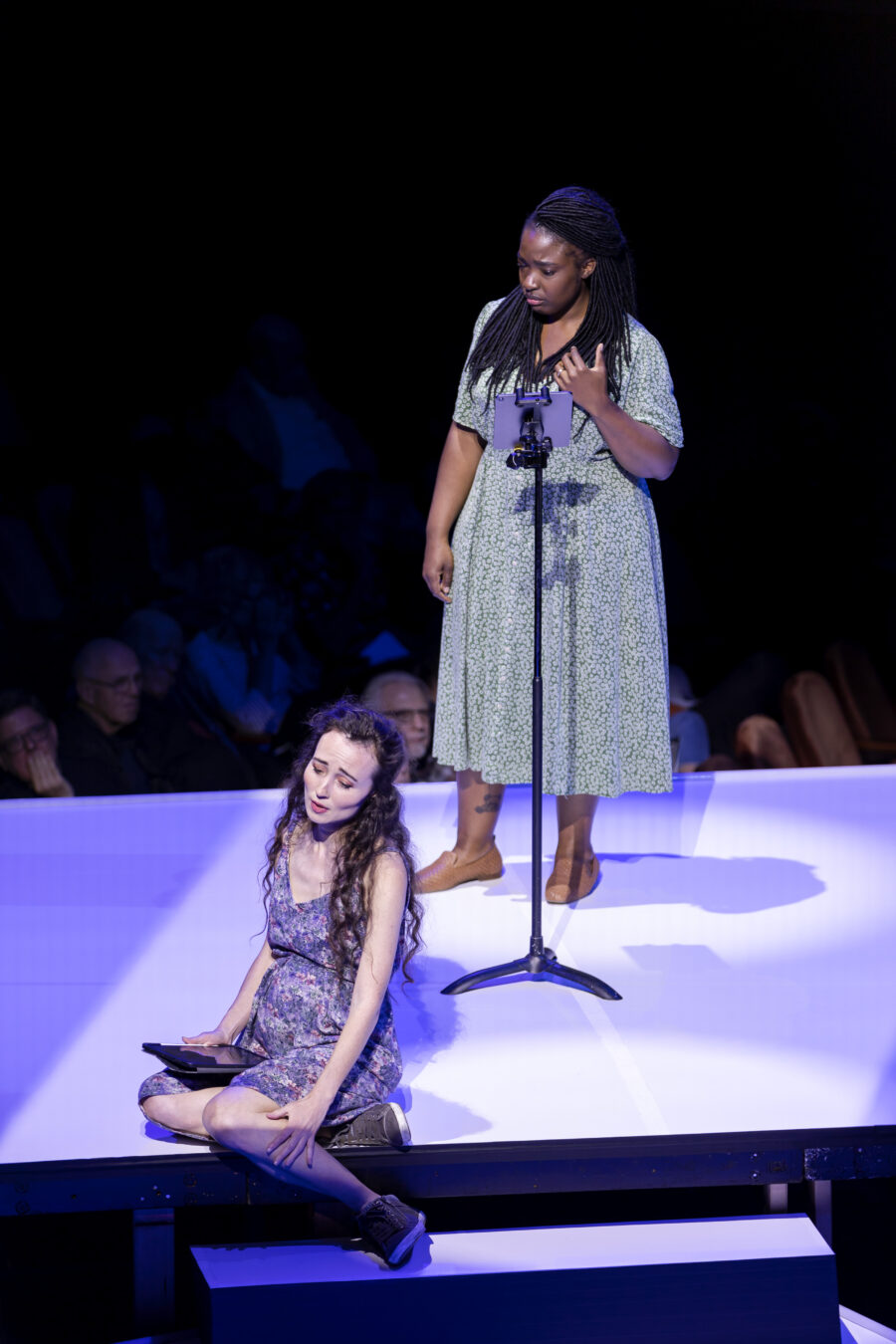

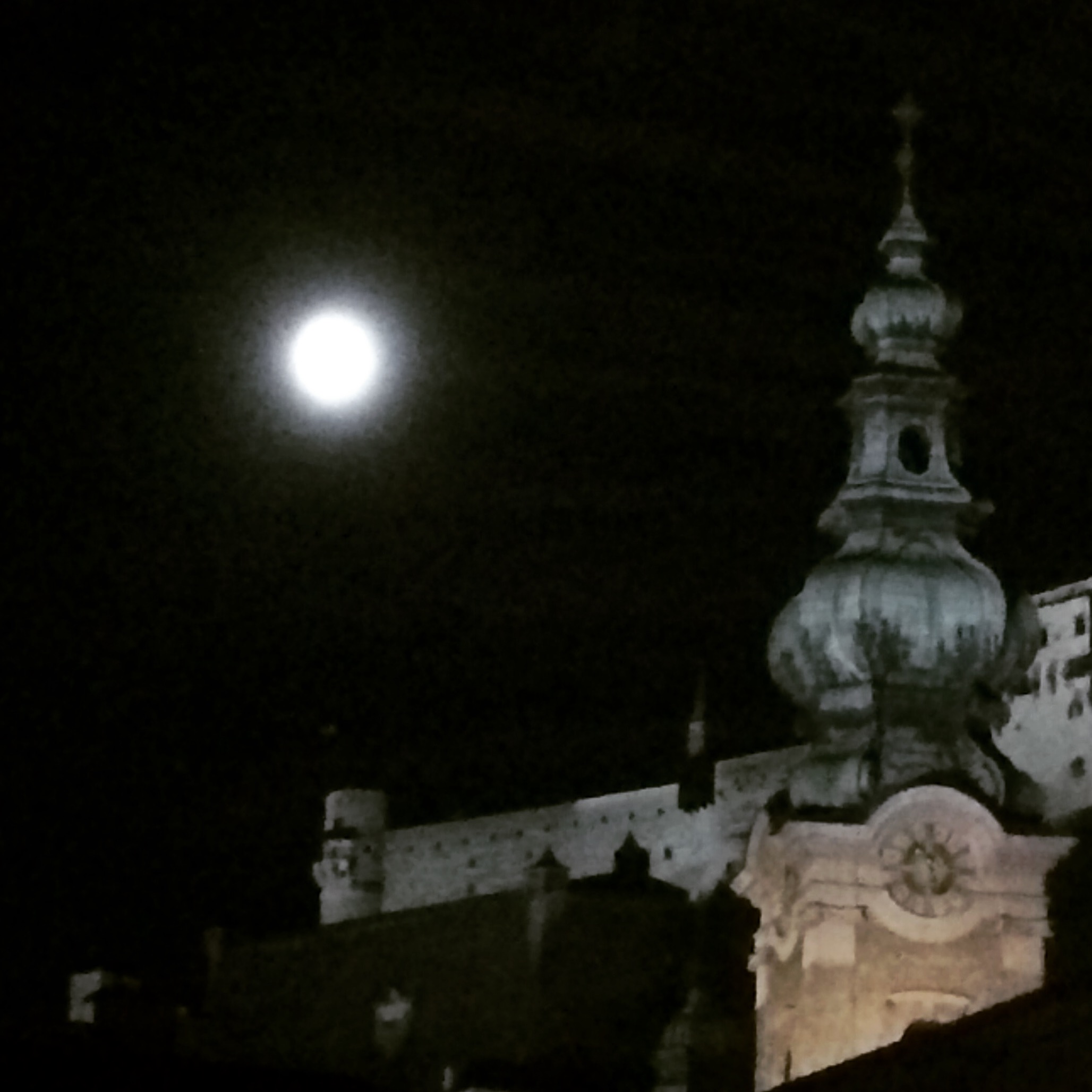
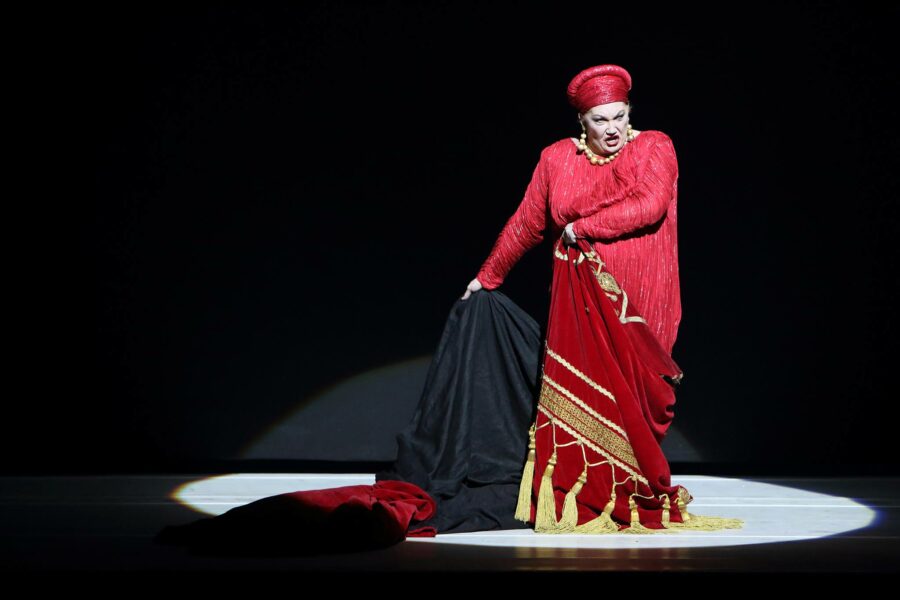

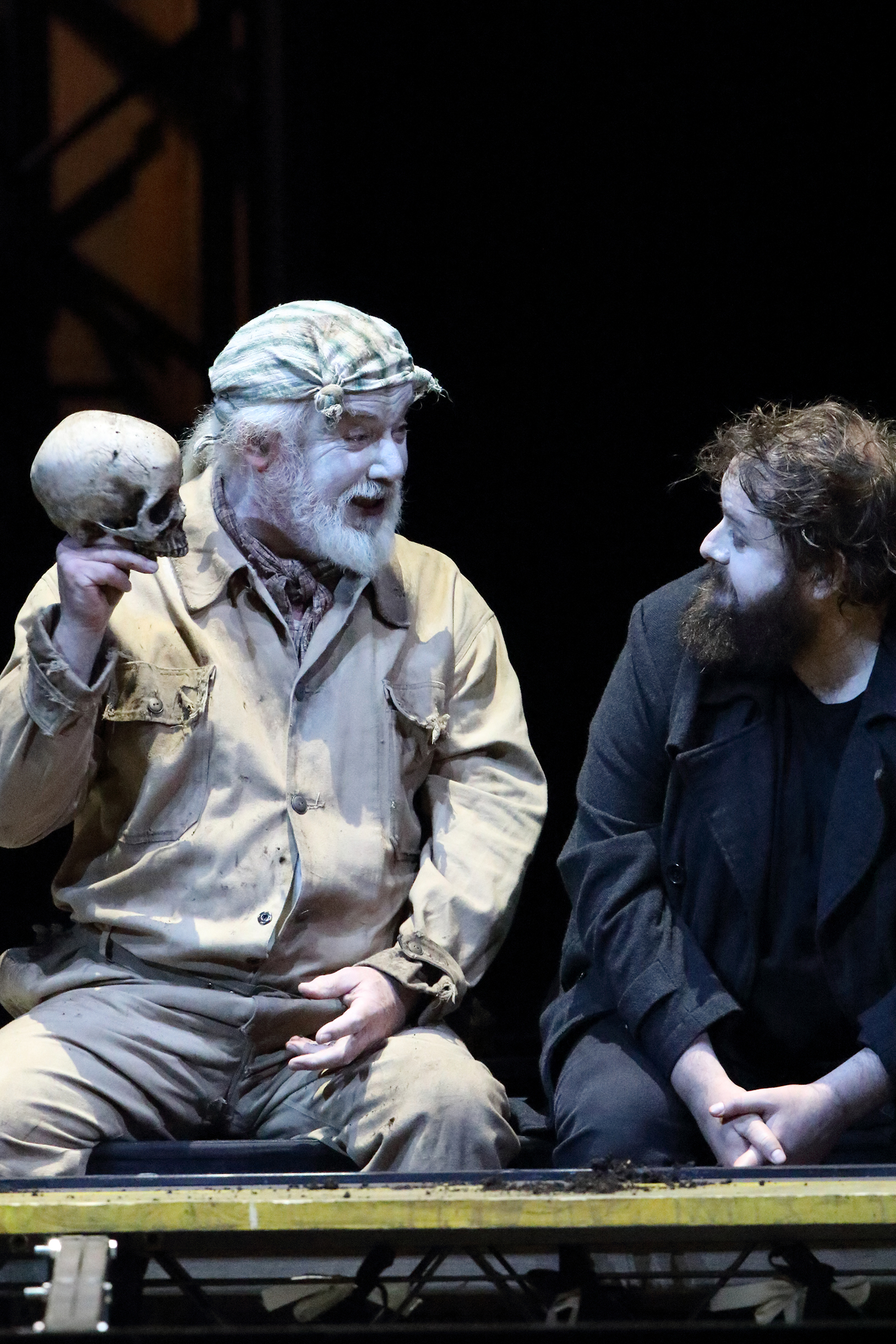

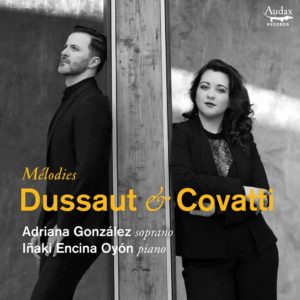 So what a treat it was, to come across the album
So what a treat it was, to come across the album 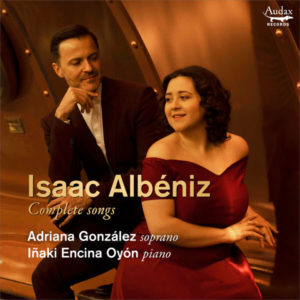 As I learned when we spoke recently, González, while highly aware of her powerful, affecting sound, is also aware of her desire to stretch, explore, and cultivate her talent creatively, with a firm hold of context at every step. We started off discussing what it was like to quickly step into the role of Liù for a performance of Turandot in Houston, as she was concurrently performing Juliette. Stress, what stress? González seems too focused a performer to let nerves ever get the best of her, and her recollection of the experience was coloured more by a mix off excitement, disbelief, and gratitude than any dregs of self-doubt. González is as much earthy as she is studious, and that intensity I referenced earlier is, as ever, always in the service of a knowing approach to craft. Such a combination of ingredients makes for a meal that satisfies toothsome ears, and for a very rewarding form of listening amidst post-pandemic times.
As I learned when we spoke recently, González, while highly aware of her powerful, affecting sound, is also aware of her desire to stretch, explore, and cultivate her talent creatively, with a firm hold of context at every step. We started off discussing what it was like to quickly step into the role of Liù for a performance of Turandot in Houston, as she was concurrently performing Juliette. Stress, what stress? González seems too focused a performer to let nerves ever get the best of her, and her recollection of the experience was coloured more by a mix off excitement, disbelief, and gratitude than any dregs of self-doubt. González is as much earthy as she is studious, and that intensity I referenced earlier is, as ever, always in the service of a knowing approach to craft. Such a combination of ingredients makes for a meal that satisfies toothsome ears, and for a very rewarding form of listening amidst post-pandemic times.